#the process of creating it forms a relationship and understanding of the world and of yourself
Explore tagged Tumblr posts
Text
Yk I don't think ai art will ever really substitute real art. Like I don't think a future like that is possible, and if I'm wrong, we'd be living in the saddest, most depressing version of reality.
The thing about ai is that it will never be able to tell you a story in the way that an artist who actually drew the image will. Even my old drawings I did at age 13 with the wonky poses and huge anime eyes could tell you more of a story than ai ever could, even if it was just a very human story about a kid who liked soulcalibur iv and wanted to draw her ocs. If I'd only been messing with ai back then instead of picking up a pencil, imagine how sad it would be to look back and realize the art said absolutely nothing about me or my personality or intentions or where I was at in my life and with my skills.
It might look pretty. Maybe. But that's it. The result is shallow. You can't read into it, you can't think about the person behind it, because it says nothing about them. It's honestly the saddest thing. I hate to think about a future where people only want to produce ai art because it just sounds so empty. You can see none of yourself and your tastes and your history in an ai produced image. I think that's what people mean when they say ai art is souless and has no human behind it, because even if a human used the ai tool to generate it, there's none of themselves in it.
Real art feels more like an inescapable mirror. An amalgamation of the things you love poured into every line and brushstroke. A frankenstein of everything in the visual world that has ever inspired or fascinated you, built up over a lifetime of learning and repetition. And the more you learn and the better you get the more it grows and the more of yourself you can see in it, the more it looks back and screams at you the story of who you are. If your art doesn't feel like a living thing your hands have birthed then what's even the point?
#I still have a lot of my old sketchbooks(I was just looking through them ajkdshksd)#where I scribbled over the years. when I was 13. 14. 15 16 17#it's such a unique feeling to look back over your old highschool sketches and just. understand#yk?#real art creates a beautiful and unique connection with yourself#there's a relationship behind it#but if a machine produces most of the work for you.......#there's just so much you miss out on#I think the most valuable thing abt art isn't even how good it looks to others or even to you#but the relationship you form with it#and I just think humans need that#there's a reason why something like 'art therapy' exists#even when creating art is frustrating or when it doesn't turn out how you imagined it#the process of creating it forms a relationship and understanding of the world and of yourself#that you wouldn't get if you took the easy path of typing a prompt and hitting a button a couple of times#sleep.txt#anti ai#anti ai art#and that's not even to mention how much we miss out on when analyzing art#bc analyzing art made by a human can give you so much understanding about a person and the world around them#while analyzing ai will only give you more understanding of the machine. the program that produced it. not of the person#which is also really sad and cold
63 notes
·
View notes
Text
ASTRO PLACEMENTS/ASPECTS NOTES [01]

🕯️ MERCURY SQUARE NEPTUNE ੈ✩‧₊˚
── this aspect can indicate difficulties surrounding one's ability to effectively connect with those around them. the native may communicate in a way that is "elusive" to others, resulting in feeling misunderstood or isolated. this can also indicate a very literal barrier in terms of language or one's speaking abilities, or struggling in neurotypical learning environments. this doesn't mean that the native is unintelligent, or intentionally trying to come across as deceptive to others. rather, their understanding of the world and reality as a whole is vastly different than the average person. they tend to be very imaginative and artistic individuals, and as a result they usually have a "spiritual" or poetic way of interpreting and explaining things.
── it would benefit these natives to take on habits or practices that grant them the ability to stay grounded, all the while holding space for their need to escape to the imaginative worlds they create for themselves. they may need to work towards developing the ability to remain practical in situations that call for objectivity, rather than being too passive. despite their hardships, when these natives maintain balance between self-discipline and their creativity, they're able utilize both of these skills to to navigate life and excel in their endeavors. in terms of spirituality, they tend to manifest things very easily, and typically encounter messages in the astral realm that provide clarity to the things that they experience in their reality.
🕯️ MOON SQUARE SATURN ੈ✩‧₊˚
── this is one of the most difficult aspects in astrology, in my personal opinion. these natives tend to struggle with a significant amount of emotional turmoil as a result of challenges in their childhood, and/or strife between themselves and their mothers (or any relevant maternal figures). due to a lack of control in their youth, they can come across as authoritative or domineering to others. they tend to exhibit this behavior so as to not feel like they're being subjected to the same "coldness" they encountered growing up. this can manifest in the opposite way, where the native could struggle with self-compassion, and adopt extremely codependent, self-destructive habits as a means to find it through other people.
── these natives could benefit from having mentors, or older, wise figures they can look to for guidance and clarity in times of strife. they tend to encounter situations in adulthood that call for them to unlearn the unhealthy mindsets they developed as children. it's not an easy process, but it's crucial that these natives grow and evolve to a point where they can feel and express their emotions without feelings of fear, shame, or guilt. as doing so will lead to far more fulfilling relationships, both with others and with themselves.
🕯️ JUPITER TRINE URANUS ੈ✩‧₊˚
── those with this aspect tend to have a very enthusiastic, open-minded approach to life. these natives usually have an innate interest in all things unorthodox, and seek to research and learn about more unconventional matters. their lifestyle could also revolve heavily around technology in some way shape or form. the quote, "being right too soon is socially unacceptable," by Robert Heinlein could be applicable to their lives, as their ideals tend to be very progressive in nature as a result of their extremely strong foresight. they can carry themselves in a way that others may deem contentious, but with the harmony of the trine, this could be a trait that is actually deemed admirable by others, and they may even be viewed as pioneers of their generation as a result.
── these natives tend to attract the attention of others by default, even if it's not necessarily their intent. they have a way of expressing their individuality that innately draws people in. as a result of their independent nature, coupled with their ability to be optimistic in the face of whatever it is that life throws at them, they could find themselves in positions of leadership. their creativity lends itself in their favor in times of crisis, as they are more likely to view hardships as opportunities, rather than challenges.
🕯️ MERCURY SEXTILE ASCENDANT ੈ✩‧₊˚
── these natives are typically viewed by others as clever, quick-witted individuals. even if they're more on the reserved side, their intelligence is usually something that doesn't go unnoticed by others. they tend to be excellent communicators, and may have a habit of being very expressive, specifically with their hands and arms. their ability to articulate their thoughts and ideas to others is probably their most favorable characteristic, alongside their ability to adapt when collaborating with other people. they could also have a knack for reading others through their body language as well.
── understanding new or unfamiliar information usually comes easy to them due to their open-minded, optimistic outlook on life. they tend to have a habit of jumping from idea to idea and have the capacity to see things from every perspective. while this could manifest as a sense of restlessness or anxiousness (depending on the full context of the chart), the sextile here provides an ease to this mercurial energy. while these natives may have to work towards developing the ability to focus on the bigger picture rather than the minutia, their need to tend to the latter still works in their favor more often than not, and is typically lends itself as more of a skill rather than a detriment.

🕯️ MARS TRINE PLUTO ੈ✩‧₊˚
── this aspect provides the native with an extremely strong-willed approach to their goals. they tend to have a very prominent sense of ambition and determination, but these tend to be underlying characteristics that the native holds close to themselves. despite their reserved nature, this energy is usually something that others are able to pick up on very easily. these natives usually find that others tend to be very receptive in cases where they assert themselves, and it could even be something that others find attractive as well. there's a prominent sex appeal that these natives tend to have that they're able to utilize in order to achieve their goals, and their sexuality generally may be of great importance to them. they tend to have a lot of stamina when it comes to intimacy, and they usually seek a partner that can match that energy.
── power struggles can be prevalent with this aspect, but these struggles typically don't manifest as negatively as they would with the square or opposition. mars/pluto natives tend to push back against authoritative behavior from others and don't react kindly when put in situations where others seek to control them. with the trine, there's usually more of a constructive approach to the expression of the energy between these planets. a healthy manifestation of this aspect would appear as dedicating this intense, persistent energy towards self-transformation. these natives need to ensure that they're using their power as a means to heal, rather than exerting it upon others as a means for control.
🕯️ JUPITER CONJUNCT SATURN ੈ✩‧₊˚
── natives with this aspect tend to have a pretty good grasp on how to maintain harmony between their need for expansion and their need for structure. if the full context of the natal chart points to this aspect manifesting positively, this can indicate that the native will reap the benefits of their hard work and dedication to attaining the life that they aspire to have, typically later in life or post their first saturn return. they tend to have very grand dreams and desires, and saturn's influence here forges a stable, structured pathway to achieve them. on the contrary, if jupiter or saturn are afflicted, this can indicate struggling with feelings of restlessness or apprehensiveness. they can struggle at times with overestimating their capacity to get things done, or struggle with being too immovable and stuck in their ways.
── these natives typically have to work towards maintaining equilibrium between their optimistic, open-minded nature, alongside their rational, more objective side. generally, these natives tend to excel as mentors and teachers, due to their innate fascination of knowledge and disciplined approach to learning. philosophy specifically could be of great interest to them, as well as religion and spirituality. they tend to be very dedicated to living life by the ideals that they believe in. this can also indicate inheritance through death as well.
🕯️ MARS SQUARE NEPTUNE ੈ✩‧₊˚
── with this aspect, there tends to be a lack of discernment in terms of taking action. they can stumble their way through trying to reach their goals, if they even get to taking the first steps at all. they may struggle at times with having an illusionary approach to life, and grow resentful or self-victimizing when they inevitability come face to face with reality. they can have difficulties surrounding their self-image, and as a result struggle with asserting themselves, addictive tendencies, or feelings of internalized shame. in conflict, others may view them as passive aggressive or vindictive. those around them can suspect them as having covert motives or being dishonest, even if that isn't indicative of their true behavior. this can also manifest in the opposite way, where they struggle to recognize the true intentions of others.
── these natives benefit greatly by implementing habits into their daily routines that keep them grounded. exercising, yoga (tantric specifically), or any practice where they're able to move their bodies and enter a meditative state could be beneficial to their mental and physical well being. journaling can be of value to them as well, as it grants them the ability to put words to their feelings and keep track of their emotions. having a creative outlet can help as well, as this is an aspect that grants the native with an innate artistic streak that they're able to express themselves through. they would also benefit from having reliable people around them who motivate them feel self-assured, to be accountable, and to stay on course to accomplish their goals.
🕯️ VENUS CONJUNCT MARS IN THE 7H ੈ✩‧₊˚
── natives with this aspect tend to be very charismatic and determined in relationships (both platonic and romantic). they're typically very dedicated, protective lovers, and can definitely have something of a "jealous streak", but this typically doesn't manifest in a detrimental way like the venus/mars square or opposition. this can indicate having an energy that others find attractive and benevolent, which can benefit the native not only in terms of romance, but also in terms of business partnerships. this aspect can lean itself to aiding the native in terms of work and career opportunities, as this indicates getting on well with their peers and social circle. their sexuality tends to be a significant aspect of their lives, and they may struggle at times to remain in long-term relationships where sex is mundane or boring, as they require excitability and stimulation when it comes to intimacy.
── if venus or mars are conflicted in the natal chart, and depending on the planetary ruler of the 7H, there could be difficulties with codependent and/or domineering behavior. in this case, the native must work towards finding harmony between their venusian and martian energy. typically, the relationship that the native had with the opposite sex parent growing up plays a significant role in how they show up in relationships as an adult, and it may be useful to look towards that dynamic to unpack what parts of themselves need to be healed in order to have healthy, functional relationships in adulthood.

🕯️ SUN SQUARE MOON ੈ✩‧₊˚
── with this aspect, there is innate tension between the head and the heart. these natives struggle to find unity between what it is that they need to feel accomplished and what it is that they need in order to feel safe. there may have been tension between the parents, or tension between themselves and either (or both) of their parents that had a major impact on their identity and confidence. they may be perceived at times as emotionally unstable by others, and struggle at times to rein in their feelings and act from a place of objectivity. these difficulties can also have a negative impact on the native's personal relationships, and ultimately influence self-sabotaging behavior.
── these natives typically need to work towards unpacking their inner turmoil and where this tension stems from, so that they can approach conflict in their everyday life from a place that is rational rather than reactive. through growth and acceptance, they can attain harmony between their need for independence and their need to feel emotionally secure. regardless of their hardships, these natives have the determination and strength that grants them the ability to power through whatever obstacle life throws their way.
🕯️ SATURN TRINE ASCENDANT ੈ✩‧₊˚
── this aspect can indicate being perceived as someone who is very knowledgable, responsible, and perhaps too rigid at times. these natives tend to have an air of authority to them, and because of this people can be inclined to turn to them for leadership or assistance in times of crisis. while this isn't inherently as negative as the square or opposition, these natives may grow to feel overburdened with taking accountability for others if they don't implement boundaries in their relationships. they typically have a very measured approach to life, and are usually respected for their ability to focus and remain on track in high-stake situations.
── saturn on the ascendant can provide something akin to a "mask" when it comes to the native's emotions, due to this they can come off as aloof or distant to those around them. they may find that they get on easier with authority figures, mentors, or older people rather than their peers as a result of their more mature or "serious" demeanor. in terms of physicality, their bones/tendons/ligaments, teeth, skin, etc. can be prominent in terms of both vitality and appearance. personally, i've noticed that saturn/ascendant natives tend to have issues with their back, and/or start greying younger than most.
🕯️ MERCURY SEXTILE MARS ੈ✩‧₊˚
── these natives tend to have very agile, fast-paced minds. they can be somewhat blunt when communicating with others, but this tendency is usually perceived more so as honesty rather than aggression. they also have a charm to them that allows them to get away with more than someone with the opposition/square between these planets could. they typically view knowledge as an extremely valuable tool, which is why they usually take joy in debates and intellectual spars with others. these natives may also have a flirtatious nature about them, or simply appear that way to others whether they intend to or not.
── while there can be a difficulty for them to focus at times, their restless nature can work in their favor more often than not, as they are typically very inspired and ambitious in their pursuit of learning and processing new information. this, paired with their risk-taking nature, can lead them to positions of power and leadership. they may have to work towards not being too self aggrandizing, and recognize the value in what they can learn from those around them and how much they can benefit from working alongside others.
🕯️ SUN SQUARE JUPITER ੈ✩‧₊˚
── with this aspect, misjudgment can be a prominent, recurring theme in the natives life. with sun/jupiter placements, there's typically an innate ease when it comes to manifesting one's desires, with the square, difficulties can arise with overconsumption, and more specifically, with overestimating one's abilities. as i've said before, jupiter is a planet that will match your energy, which is why it's important to have moderation and self-control when it's aspecting a personal planet. with the sun square jupiter, pride and gluttony can have disastrous effects to the native's life and relationships with others.
── these natives may struggle with seeking affirmation and approval from others when it comes to their talents and accomplishments. it's important for these natives to recognize that their worth is not derivative of materialism or external praise, rather, it's something that is innate, that you have to find within yourself. this can also manifest as a stubborn, over-dedication to one's ideals or spiritual beliefs that can cause friction in their day to day lives. ultimately, it's important for these natives to recognize the importance in approaching life from a place tact and objectivity. this doesn't mean that they must dilute their optimistic, jovial nature. rather, they need to find balance, and know when to take off the rose-colored lenses and take a more rational approach.

🕯️ URANUS SEXITLE PLUTO ੈ✩‧₊˚
[this is a generational aspect, meaning the people born under this transit will collectively share this energy. the "relevance" it has in your chart will be reflected by how tight the orb is, as well as where uranus and pluto fall in your houses, and what personal planets they're aspecting.]
── these natives tend to be very radical and unconventional in their approach to life. they can encounter a lot of transformative experiences in their lives that push them towards growth and self-actualization. in turn, they wish to see the collective as a whole evolve for the better, and due to their strong foresight, they're able to visualize the steps that must be taken in order to bring change to our reality. what others may view as being disruption or chaos, these natives view as opportunities for development.
── if this is a prominent aspect in one's natal chart, it can indicate that they will be something of a "pioneer" for their generation. the role they play will be related to dismantling and rebuilding traditional structures in order to make way for more relevant, updated means of living as a society. activism and humanitarian work can be of great importance to them, and they may excel in these fields due to their open-minded understanding of both themselves, and of others.
🕯️ MARS OPPOSITE SATURN ੈ✩‧₊˚
── with this aspect, there tends to be an push and pull between one's desire to act and their need for structure. these natives may encounter their fair share of hardships on their path to success. a major lesson for these natives may be learning to approach these obstacles with a level head, rather than from a place from resentment and anger. if this is a prominent aspect in the natal chart, it's possible that these natives have a reputation for their temperament, due to their instinct to bottle up their feelings and hold on to residual discontent, which can result in outbursts that can have a negative impact on their character, relationships, and health.
── it's crucial that they have outlets that allow them to release any pent up energy in a healthy, constructive way. in doing so, this also helps them to develop a sense of self-control and confidence. this is also an aspect that can struggle with others impeding upon their independence. it's important that these natives heal any wounds regarding authority, as the un-evolved energy of this aspect can lead to domineering behavior and control issues. when worked through, the energy of this aspect can lend itself to aid the native in effectively working towards and accomplishing their goals.
🕯️ MOON CONJUNCT SOUTH NODE ੈ✩‧₊˚
── with this aspect, the domestic life and matters related to the family/maternal figures reveal what the native needs to let go of in order to evolve spiritually. there may be habits or beliefs passed down from one's family that restrict the native from connecting to their higher self. despite this, they tend to have a very strong intuition and are able to pick up on the emotions of others very easily, although, they may struggle at times with feelings of insecurity and not feeling stable. their childhood, or home life in general, could be where these feelings of anxiety stem from specifically.
── if unchecked, this aspect can fester into feelings of codependency, or a "savior-complex", especially in romantic connections. it's crucial for these natives to sit with themselves and unpack their relationship to giving and receiving nourishment, as this will help in healing the turbulent, emotional wounds they house within themselves. they must work to recognize that their sensitivity is not a flaw or something to be ashamed of, rather, it's a characteristic that has the capacity to aid in their growth, rather than hinder them.
🕯️ VENUS SQUARE SATURN ੈ✩‧₊˚
── those with this aspect can encounter a fair amount of hardships regarding relationships and self-worth. they may have struggled with insecurities regarding their physical appearance in youth that follow them into adulthood, which can impact how they navigate romantic connections with others. they may attract partners that are domineering or controlling, or they may exhibit this behavior towards their partner themselves. it's also possible that these relationships are long-distance, or there is an age-gap present. with age and maturity, these natives may find more ease not only in romance, but in their relationship to themselves as well.
── working with this aspect requires healing the parts of yourself that are deeper than the superficialities assigned to venus; you will not love or respect yourself more by adhering to unattainable beauty standards or over-consuming trending products and fashion. with venus square saturn, there is innate restriction placed upon one's values, specifically, the worth that the native assigns to themselves, resulting in depression or a pessimistic approach to life. to heal this aspect means to develop a sense of love and respect for oneself that is innate, rather than looking to material means or other people to provide it for them.

🕯️ MARS SQUARE NORTH NODE ੈ✩‧₊˚
── with this aspect, one's impulse and temperament can cause difficulties in their ability to grow towards the person that they need to become. these natives can be stubborn or immovable in how they approach their goals, and more specifically, how they engage with their personal growth and evolution. for these natives, it's important for them to practice patience, and to seek fulfillment through working with others, rather than prioritizing their independence.
── it's usually with age that we're able to grow and evolve to a point where we can embrace the qualities that our north node pushes us towards. with mars square north node, the lesson to be learned here is understanding when a risk is worth being taken, versus knowing when to recede and step down. these natives must recognize the importance in expressing their passion from a place of determination, rather than resentment or rage.
🕯️ MIDHEAVEN SEXTILE PLUTO ੈ✩‧₊˚
── this aspect can indicate having an tenacious, relentless approach to one's career. these natives can be perceived as polarizing by the public, or have a reputation that is somewhat controversial in nature. they may go through many changes in their professions, work in fields that are taboo in nature, or work with people who are deemed outcasts by society (e.g. social work, counseling, the occult, sex work, creative arts, psychology, research, etc.) these natives can find themselves in positions of power quite easily, as they tend to have a magnetic energy about them that they can use to their advantage.
── their dedication to the careers can be obsessive in nature, and as a result they may need to work to implement balance between their work and home life. if pluto falls in the 10H, it's possible that these natives may have had a relationship to either of their parents (or any relevant authority figures in their youth) that was deeply transformative in nature, and shaped the way that they approach their professional lives and are received by the public and their peers. they have an innate understanding of the human psyche, and are able to utilize this knowledge to achieve goals in their career.
🕯️ URANUS IN THE 3H ੈ✩‧₊˚
── this placement can be indicative of experiencing a large amount of change in one's immediate environment. these natives may have moved around frequently growing up, changed schools a lot, or encountered frequent upheaval in their home lives, specifically related to any potential siblings. this can also manifest as a sense of "restlessness" regarding the native's immediate environment, they may struggle with having a mundane routine, and change their habits or travel frequently as a result.
── this can also indicate that the native's sense of individuality is very important to them. specifically, they may have very unorthodox, innovative ways of thinking and communicating their ideas, and can struggle when they feel as though those ideas are not understood or being taken seriously. this is an issue that could've been more prevalent in their early education, specifically in regards to their relationship with teachers or authority figures. these natives benefit most when they're around fellow, like-minded people, and generally seek to implement new ideas and thought processes to further advance those around them and the collective as a whole.


dividers by dollywons
#(another rp from the old blog)#astrology#astrology notes#astrology signs#astro observations#astro notes#astrology observations#mercury square neptune#moon square saturn#jupiter trine uranus#mercury sextile ascendant#mars trine pluto#jupiter conjunct saturn#mars square neptune#venus conjunct mars#venus in the 7th house#mars in the 7th house#sun square moon#saturn trine ascendant#mercury sextile mars#sun square jupiter#uranus sextile pluto#mars opposite saturn#moon conjunct south node#venus square saturn#mars square north node#midheaven sextile pluto#uranus in the 3rd house#synastry notes#composite chart notes
626 notes
·
View notes
Text



time to learn a little bit about the Yells. i've been writing a few lore posts for a while and instead of continuing to let they grow and fretting over them, i think i'm just going to throw a few out there and try to finish up the rest this week.
The Yells
Despite their imposing size, strange behaviors, and mysterious keepers, the Signallusc (or The Yells as most rabbits call them) are considered just another part of the island landscape. These towering faux trees serve as the island version of radio towers, and make all radio communication above and below ground possible.
Though the 2 largest of the naturally formed Yells are still upright and active (and heavily protected so that their natural life cycle can be properly studied), these days rabbits prefer to cultivate the towers so that they don’t grow in problematic areas or do…other things.
Wild or free growth Yells make their homes in dead rotting wood as natural decomposers, and many live out their lives as simple slime molds (or as simple as any slime mold can be). Certain conditions must be met to trigger the drastic color change and vertical growth that make them viable for communication use, and so wild Yells are usually found growing in small clusters in or around the resources they need to sustain their new forms. Dead trees or stumps with roots still in the ground are prime hosts for these slime molds and they’re actually seen as beneficial since they stabilize potentially dangerous dead trees and kill diseases or especially destructive insects that might harm surrounding living trees. Once inside these dead trees the slime mold eats them from the inside out, taking the branches first, and then devouring the mass from the top down.
Compared to other slime molds they can handle direct sunlight quite well, but wild yells still tend to favor hosts in shady areas and from the way these trees are devoured they seem to try and keep some sort of shell around them for as long as possible. This wooden shell not only serves as food, but also gives the growing Yell a moist, dark, home until its outer membrane is thick and strong enough to handle being constantly exposed. When wild Yells “die”, it’s usually because they’ve run out of host tree long ago, and have stiffened into a rigid structure that eventually cracks (usually due to being struck by lightning) and crumbles, releasing clouds of spores. The remains of a Yell dissolve in the first rain after they fall and tend to leave the area around the strange lotus pod-ish pit in the ground where “roots” used to be spotless, but smelling very metallic with a hint of foulness. Almost like not so fresh blood.
Through the observations recorded by island botanists and the specific botanical sect known as the Antenna, rabbits (and hares, as they were the first to investigate and made great strides in understanding the process before they left the island en masse) have learned exactly what triggers Yell vertical growth and have used this knowledge to cultivate Yells quite successfully. A combination of owl feathers, metal ore (mainly bog iron), charcoal sticks and or ash (best if created by lightning strike, wood preferred but animal remains like burned out hawks are perfectly acceptable), and a little starter wood are fed to the slime mold, and after it’s broken everything down it begins its transformation. It is then introduced to a host plant sprout, a type of fast growing, woody, creeping vine in the Grasp family bred specifically for this purpose (wild cultivars work fine but they’re half as hardy and the bond has a greater chance of triggering very upsetting mutations. These are different from the upsetting mutations, which are fine and harmless). From then on the slime mold seems to guide the host plant’s growth, forming a shell from the vines that is constantly growing and shedding. This serves as both a home and an ample food source.
The botany world is torn on whether this forms a mutualistic symbiotic relationship or whether it’s straight up parasitism. And yes, plant nerd blood has been spilled over this argument. Not a ton of blood, it’s not like this is the great lichen wars, but still.
The Antenna
All yell care-taking is done by the Antenna sect. This is a mysterious group of witchy botanists and engineers who, like the previously referred to upsetting mutations, are harmless despite their entire vibe. Well. Harmless enough for botanists anyway.
Not a lot is known about them by the general public but they keep things working smoothly and show up quickly when something isn’t.
Members of this sect haven’t had a set “look” or uniform for about a generation and a half due to the ending of a lot of the the founding member’s bloodlines, but each Yell site has it’s own culture that attracts certain kinds of people. Despite their differences, there are a few things that make Antennae easier to pick out of a crowd if you know what to look for. The skin of their inner ears develop thin branching markings or wave-like ripples depending on how they interact with Yells. Some have obvious hare ancestry and sport roughly branching horns that grow quite long and shed every year (these shed horns are fed to the Yells). Newer members wear a lot of lightweight ear jewelry to help pick up important signals and behavioral quirks from the Yells, but the longer they stay in the Antenna the less tolerant they are of this. Things get…loud. Behind their eyes. Inside their teeth. Seasoned members usually can’t stand wearing any metal jewelry at all. The head botanist of one of the most remote Yells wears ear plugs almost 24/7 because of left behind shrapnel from an accident in his youth.
He is deaf.
He says he’s not really blocking anything out, just sorting it properly.
No one really knows what he means. It’s fine.
798 notes
·
View notes
Note
I assume you’ve probably answered this before, but what exactly is the underlying politics of this blog? I don’t quite understand the connection between neoliberal capitalism and pictures of desolate housing listings.
Thanks if you take the time to reply! -anon
We live in a bizarre intermediate period where capitalism appears to be eating itself. I originally came across the Gramsci quote in the header via Noam Chomsky in 2015/2016, when he was using it to refer to the pre-Trump lunacy that was taking over the Republican Party. In the US, this seems to have been a sort of cancerous outgrowth of decades of austerity and privatisation and deregulation that began with the end of Bretton Woods and took off in earnest in the 80s under Reagan. Similar processes have been at work to varying degrees across much of the world, throbbing occasionally with particular enthusiasm depending on the elected government, abating temporarily during other periods of Third Way-ite labour stagnation. Housing is at the core of these recent historical trends, and of the relationship between the government and its citizens. I don't know if it could exactly be called the main driving factor, but it plays an enormous role in how we work, how we form relationships, and how we interface with society generally. I remember reading a quote from a conservative politician in the UK in the 80s, responding to a question about why they didn't build more public housing to address the growing homelessness problem; he said something to the effect of 'that would just breed another generation of Labour voters.' I think the cannier politicians (and business leaders) are very aware of their capacity to shape our lives through housing like this.
A similar process has been at work in my country since World War II. We had a succession of two very good Labor Prime Ministers during the 1940s: John Curtin and Ben Chifley. They developed our version of the vast postwar public housing programs that most Western countries had. This provided stable, affordable (or often just free) housing for a huge chunk of the population who wouldn't have had access to it before the war. After Chifley, a conservative government under Robert Menzies came to power in a wave of anti-communist hysteria. Menzies appealed directly to a class of the population which he called the 'forgotten people': people in the middle strata of society who, in his characterisation, didn't get involved in trade unions or radical political organisations, didn't protest, and just wanted to get on with their lives in an apolitical solitude. In reality, this was less of a class of people that already existed and more one he set out to proactively create. He did this, in part, by altering the public housing scheme to give the baby boomers the right to buy the property the government had given them. This entrenched home ownership and, arguably, introduced a level of scarcity to the public housing stock in the long-run, and set the groundwork for later government support of housing as a financial asset, guaranteed to appreciate. It also, in a way, helped create that class of 'quiet' Australian: a solid middle 75-80% of the population that could be guaranteed a comfortable, suburban lifestyle, within an apolitical bubble quietly guaranteed by interventions into the economy by the government and regulation of the housing market in their favour. Over the years, this proportion of the population has gradually decreased, more markedly so since the overt financialisation of housing under John Howard in the early 2000s, and it's fallen off a cliff since COVID.
There's a tradition in art that I've been interested in for a while which involves broadening creative fields (in artmaking or criticism) through direct engagement with fields of work, of machine production, of lived experience or other symptoms of the oppressive political reality we live under (realism in the Linda Nochlin sense). You see it in the controversy around Courbet's paintings of manual workers, much of Andy Warhol's work and general contempt for the art world (his silkscreens of graphic photos of car crashes he found in the newspaper stand out to me), or more recently some of the controversy that came from Tracey Emin's installations. More broadly, there's something to be said about the conscious effort to make transparent and use aesthetically the machine behind the reproduction, or distribution, or amplification, etc., of art. The use of feedback in music seem to me to be an example of this. To use a couple of examples of a period of music I'm particularly interested in, grunge is one example, but so are reggae sound systems which use custom-made valve amps that give an enormous low-end to vinyls they would play, to the point of using the records as instruments to create a sort of rumbling distortion (Jah Shaka's sessions seem to have premediated alternative rock, operating on parallel tracks). These forms of creative production seem to organically emerge from the detritus of industrialisation, and seem to respond to its alienation and atomisation of human relations. I'm interested in breaking the functionality of illegitimate systems. At uni I took a series of photographs of the backs of shops. There was something comforting in identifying how a commercial entity wanted to be presented visually, and then representing it in the exact opposite way. Similarly, though I don't know if this could be considered an art project, I like an incompetent realtor. The aesthetic qualities of a real estate listing that completely fails in its intended purpose can be quite rich, in some ways liberating. An enormous amount of imagery is generated by the institutional machinery of commercial institutions, much of it ephemeral. If you rescue some visual artifacts from this increasingly engorged flood and look at them against their intended purpose you get a little window into the broader world, where advertising agencies and algorithms and real estate agents and SEI specialists, etc., aren't constantly grabbing your face and forcing you to look at the most boring and monetisable parts of the visual world. You have the opportunity to experience fear, hate, genuine nostalgia and melancholy, various other complex passionate experiences inaccessible in the neoliberal digital machine perversion of visual culture and creative experience.
This is a kind of a roundabout way of answering your question. Maybe part of my motivation has something to do with the relationship between art and work. If you reject the art as some higher, privileged category interpretation (i.e. this is just a photograph, but this other photograph is Art), then the boundaries of what constitutes art, or what can be read as art, are pretty porous. The machinery of industrialisation and capitalism took away the ability of people working in home workshops to have some control and creative involvement in their own working lives and turned them into atomised, specialised machine parts at the mercy of their employers and the market. The parts of work that could be considered contiguous with what we call art have been severed. Art and artists have suffered the same effects; contemporary artists seem to me not that different from other independent professionals. If you go to a dentist's office on Cambridge Street in Perth they'll often have a brochure with a blurb about their history and their mission as medical professionals, etc., on the front counter, and by the same token every artist in an exhibition is taught to provide their own little didactic overview of their niche interests, mostly independent from deeper, shared commitments (lumped together like a sack of potatoes, per Marx). I feel it makes sense to reach back out into other parts of the economy force art into them.
352 notes
·
View notes
Text
2025 : #25 how to be a brand new person
Imagine looking in the mirror one year from now and seeing someone completely transformed ? Not just different clothes or a new haircut, but a fundamentally evolved human being with new patterns of thinking, behaving, and engaging with the world. This comprehensive transformation is not only possible but follows predictable psychological principles that we can understand and apply systematically !! (It's easy)


Understanding the science of personal reinvention
Before we explore the practical steps, let's understand what happens in your brain during major personal transformation. Your current identity exists as a complex network of neural pathways that have been strengthened through repetition over years or decades. Every time you think a familiar thought, react in a typical way, or engage in habitual behavior, you're essentially walking down a well-worn mental path.
Think of your brain like a forest where certain trails have been walked so frequently they've become highways. ur automatic responses, emotional patterns, and behavioral tendencies represent these heavily traveled neural routes. Becoming a brand new person means consciously creating entirely new pathways while allowing the old ones to gradually fade from disuse.
This process leverages neuroplasticity, which is your brain's remarkable ability to reorganize itself throughout your entire life. Scientists have discovered that you can literally rewire your brain through conscious effort and repetition. The key insight here is that your current personality and patterns are not fixed traits but rather learned responses that can be unlearned and replaced.

Phase one: Deconstructing ur current identity
The first step in becoming brand new involves taking an honest inventory of who you currently are. This isn't about self-criticism but rather about developing awareness of the patterns that define your present existence. Most people operate on autopilot, unconsciously repeating the same thoughts, emotions, and behaviors day after day . Begin by observing urself as if you were a scientist studying an interesting subject. Notice your automatic thoughts throughout the day. What stories do you tell yourself about your capabilities, your worth, and your place in the world? Pay attention to your emotional patterns. What triggers you consistently? How do you typically respond to stress, conflict, or unexpected challenges?
Examine your daily routines and behaviors with fresh eyes. What time do you wake up and what's your first action? how do you move through your morning routine? What conversations do you have with yourself in the shower or while commuting? These seemingly minor details actually form the foundation of your current identity.Consider your relationships and social patterns. Who do you spend time with and what roles do you play in those relationships? Are you the helper, the entertainer, the problem-solver, or the listener? Notice how you present yourself differently to various people and which version feels most authentic versus most performed . this observation phase typically takes several weeks cuz you're identifying patterns that have become invisible through familiarity. keep a simple journal during this period, noting observations about your thoughts, feelings, and behaviors without trying to change them yet. Think of this as creating a baseline measurement before beginning your transformation.
Phase two: designing ur new identity
Once u understand your current patterns, you can begin consciously designing who you want to become. This requires moving beyond vague wishes like "I want to be more confident" to creating a detailed profile of your new self that feels both inspiring and achievable.
Start by envisioning your transformed self in specific situations. How does this new version of you handle a stressful work meeting? What does their morning routine look like? How do they respond when someone tries to provoke an argument? The more specific and detailed your vision, the more your brain can begin creating the neural pathways to support these new patterns. Consider the core values that will guide your new identity. Perhaps your current self prioritizes avoiding conflict, but your new self values honest communication even when it's uncomfortable. Maybe ur current self seeks approval from others, while your new self operates from internal validation and clear personal standards. Think about the energy you want to embody. Some people transform by becoming more dynamic and outgoing, while others evolve by developing quiet confidence and thoughtful presence. Neither approach is better than the other, but clarity about your desired energy helps guide all other aspects of your transformation.
Design new thought patterns that align with your evolved identity. If your current self thinks "I hope I don't mess this up," your new self might think "I'm curious to see how I'll handle this challenge." These shifts in internal dialogue create ripple effects throughout your entire experience.
Phase Three: physical and environmental transformation
Your external environment & physical presence play crucial roles in supporting or undermining your identity transformation. Think of your surroundings and appearance as constant feedback loops that either reinforce your old patterns or support your new ones.
Begin with your physical space because it influences ur thoughts and feelings more than most people realize. ur living environment should reflect and support the person you're becoming ofc rather than the person you've been. This doesn't require expensive renovations ofc but rather intentional choices about how you organize and inhabit your space. Remove items that connect u to aspects of your old identity (I do this every year it's so helpful !) that you're ready to release. This might include clothes that make you feel frumpy or unsuccessful, or decorative items that represent a version of yourself you've outgrown. Replace these with objects that inspire and remind you of your evolving identity. Consider how your new self would organize their living space. Someone transforming into a more disciplined and focused person might create clean, minimalist environments that support concentration. Someone evolving into a more creative and expressive identity might introduce vibrant colors, artistic elements, and inspirational materials !!
Your physical appearance serves as both an internal anchor for your new identity and an external signal to others about how you want to be perceived. This doesn't mean conforming to superficial standards but rather making choices that feel authentic to your evolving self. Perhaps your new identity calls for a different style of dress, a new haircut, or changes in how you carry yourself physically. Pay particular attention to your posture and movement patterns because these communicate volumes about your internal state. Someone undergoing identity transformation often discovers that changing how they move through the world actually helps shift how they feel about themselves. Walking slightly slower with better posture, making more direct eye contact, or using more deliberate gestures can create immediate shifts in both self-perception and how others respond to you.
Phase Four: cognitive and emotional reprogramming
The MOST profound aspects of becoming a brand new person involve rewiring your thinking patterns and emotional responses. This requires understanding that ur thoughts are not facts but rather mental habits that can be consciously changed through practice and repetition. Start by identifying the core thought patterns that define your current identity. Common examples include catastrophic thinking, people-pleasing tendencies, perfectionism, or chronic self-doubt. Your new identity requires replacing these automatic thoughts with patterns that serve your evolution (it's so so helpful trust me).
Work systematically on emotional regulation because your emotional patterns are deeply connected to ur sense of identity. Someone who transforms from reactive to responsive has learned to observe their emotions without being controlled by them. This doesn't mean suppressing feelings but rather developing the ability to choose your responses consciously ( ╹▽╹ )
Practice what researchers call "emotional granularity" by developing a more sophisticated vocabulary for your internal states. Instead of just feeling "bad" or "stressed," learn to identify whether you're feeling overwhelmed, disappointed, frustrated, or anxious. This precision helps you respond more effectively and develops emotional intelligence.
Phase Five: Behavioral integration and skcial transformation
Your new identity must be expressed through consistent behavioral changes for the transformation to become real and lasting. This phase involves systematically replacing old behavioral patterns with new ones that align with who you're becoming.
Begin with small, manageable changes that can be implemented immediately. If your new identity involves being more disciplined, start with simple practices like making your bed every morning or preparing your clothes the night before. These seemingly minor behaviors create momentum and reinforce ur evolving self-concept !
Pay careful attention to your communication patterns because how you speak reflects and shapes your identity. Someone transforming their presence might practice speaking more slowly and deliberately, using fewer words but with greater impact. Others might work on becoming better listeners or learning to express boundaries more clearly. Consider how your new identity navigates social situations differently. Perhaps your transformed self is more selective about social commitments, choosing quality over quantity in relationships. Maybe your new identity involves being more authentic in conversations rather than performing to please others !
Expect some resistance from people in your existing social circle because your changes might challenge the dynamics they're comfortable with. Some friends or family members might unconsciously try to pull you back into familiar patterns because your transformation makes them question their own choices. Developing the skill to maintain your new identity despite social pressure is crucial for long-term success 🪄 . Practice what psychologists call "implementation intentions" by creating specific plans for how you'll behave in various situations. Instead of hoping to be more confident, decide exactly how you'll handle specific scenarios like job interviews, social gatherings, or difficult conversations. This preparation helps ur new behavioral patterns become automatic more quickly.
Phase Six: Integration and Maintenance
The final phase involves developing systems and practices that maintain your transformation over time while allowing for continued growth and adaptation.
Create daily rituals that reinforce your new identity. This might include morning visualization exercises where you mentally rehearse being your transformed self, evening reflection periods where you review how well you embodied your new patterns, or weekly planning sessions where you align your activities with your evolved values.
Develop what researchers call "identity monitoring" by regularly checking whether your thoughts, emotions, and behaviors align with the person you've chosen to become. When you notice yourself slipping into old patterns, treat this as valuable information rather than failure. These moments show you where additional work is needed and provide opportunities to strengthen your new neural pathways. Understand that setbacks are normal and expected parts of the transformation process. Your old identity patterns have been strengthened over years and won't disappear overnight. When you catch yourself thinking, feeling, or acting in familiar ways, simply acknowledge what happened and consciously redirect yourself toward your new patterns.

Understanding the timeline and realistic expectations
Research in neuroscience and psychology suggests that significant behavioral changes typically require between 66 and 254 days to become automatic, depending on the complexity of the change and individual factors. Identity transformation, being more comprehensive than single habit changes, usually unfolds over 12 to 18 months for substantial shifts.
Sooo expect the process to happen in waves rather than linear progression. You'll have periods of rapid change followed by plateaus where changes integrate and solidify. Some days you'll feel completely transformed, while others you might feel like you're back to square one. This fluctuation is normal and doesn't indicate failure.
The most important insight about becoming a brand new person is that you're not actually changing your essential self but rather removing layers of conditioning and learned patterns that may have obscured your authentic nature. True transformation feels like coming home to yourself rather than becoming someone foreign.
Your new identity should feel like an expansion of possibility rather than a constraint or performance. When the changes feel forced or unnatural, it usually means you're trying to adopt someone else's version of improvement rather than evolving into your own authentic next level.
Remember that becoming brand new is ultimately about conscious choice rather than unconscious habit. Every moment offers an opportunity to choose thoughts, emotions, and behaviors that align with who you want to be rather than who you've been. This conscious choosing, practiced consistently over time, is what creates lasting transformation and allows you to become genuinely new while remaining authentically yourself. ✒️
@bloomzone
#bloomtifully#bloomivation#bloomdiary#luckyboom#lucky vicky#wonyoungism#becoming that girl#creator of my reality#glow up#divine feminine#dream life#it girl#wonyoung#this is a girlblog#girlblog aesthetic#girlblogger#girlblogging#girl blogging#self growth#self love#self confidence#self development#self improvement#just girly things#just girly thoughts#dream girl tips#clean girl#be kind to yourself#becoming her#self care
213 notes
·
View notes
Text
The longer I play Obey Me, the more I feel like Obey Me is a story about how the MC, in their quest to seek acceptance by the people they care about, ends up destroying themselves in the process and losing the very thing that made them so special and loved in the first place.
In the beginning of OG, they started off as just a normal human who got whisked away to a weird ass world where literally nobody respects them. Despite this, they recognised from the beginning that these demons and angels were not so different from humans. MC's ability to see the demons as actual people and not just beings controlled by their sins was what allowed them to form close bonds with them. They had good intentions to reunite the demon brothers who had undergone centuries of misunderstanding, resentment, and pent up grief. Even though they were excessively nosy, MC's unique position as a complete outsider allowed them to see just how much love the demon brothers had for each other, and how they can become closer if everybody would just better communicate with each other. Serving as the bridge to better improve the brothers' relationships was what convinced the demon brothers to also see MC as a member of their family.
But as the MC became more involved in the Devildom's problems, they started to adopt the same toxic traits that had created wedges between the brothers in the first place. From relying heavily on their pacts to subdue the brothers, to allowing a curse to control Barbatos (even though they had the ability to break it), to going along with the brothers' manipulative scheme to trick Satan into reconciling with Lucifer when Satan ran away to the human world -- it's almost like MC has unconsciously picked up on some of their loved ones' behaviour. Gone are the days where MC brings in a new perspective to problems. Now, they just embrace the chaos and their more darker traits, for that is what is expected of them to survive in the Devildom. And since everyone within their circle puts them on a pedestal, this further affirms to the MC that this is how they should be.
Dealing with the affairs of the Devildom had also caused the MC to grow more apathetic. In the beginning, they had been actively taking steps to form pacts with the brothers and were generally very invested in freeing Belphie from the attic. They remained true to themselves and insisted that they form a pact with Satan based on mutual trust and understanding, and not just as a means to smite Lucifer. Despite being in a helpless situation, MC never refused to give up their agency. But the longer MC gets involved with these shenanigans, the more they grew... numb to everything.
Solomon bringing me back to the Devildom unannounced? Oh, sure. Diavolo and Solomon hiding the reasons for my sudden return? Not my problem.
Simeon facing a problem to the point of having a quarter of the cast acting as his bodyguards? Eh, I'll just ignore it until I can't anymore.
Watching and waiting. That's what they have resorted to doing.
And that mindset of kicking problems down the line until it lands on MC's doorstep and they have no choice but to act -- that's exactly how they have been acting when they were stuck in NB, hasn't it? MC didn't bother forming pacts with the past version of the brothers until they were given an ultimatum, and even then, they simply relied on the convenient timing of each brother struggling with an inner crisis to swoop in, resolve the situation and tick them off their checklist.
MC in NB seems like an unfortunate culmination of everything they faced so far. They're too apathetic to care about getting sent to an unfamiliar place once again, too desensitised to life in the Devildom to reclaim their agency, and too desperate to earn the love of their former family to even think about anything else. They became so co-dependent to the demon brothers that they seem to think they cannot live without them or their affection, even if the ones they are living with in the past are different people from the ones they grew to love in the present.
The phrase "You either die a hero, or live long enough to see yourself become the villain" fits way too perfectly for the Obey Me MC. After all, MC keeps getting rewarded every time they try to get themselves killed (or even when they actually got killed). Maybe that's the only way they know how to resolve problems.
So if they can't die as the hero, they'll just learn to live as the villain.
#man ppl are writing analyses for the main LIs of the game and here I am waxing poetics about a blank-slate sheep#i am not the target audience for this game lmao#absolutely normal behaviour#obey me#obey me nightbringer#obey me spoilers#obey me mc#obey me analysis#LONG#db rambles#db vault
627 notes
·
View notes
Text
Reflected Love - Benedict Bridgerton
Word Count: 1761
Summary: When one does not see the beauty of themselves, maybe the person that loves them the most can show them, can they not?

You sat in the corner of the room, your gaze fixed upon your husband as he carefully mixed the paints on his palette.
His concentration was absolute, his movements precise and deliberate. You couldn't help but marvel at the way he could lose himself in his work, becoming utterly absorbed by the process of creation.
It was as if he were a different person when he was painting.
You recalled the first time you had seen him in this form when you were still courting.
He had been painting a portrait of you, and you had felt a strange mix of awe and vulnerability as you had watched him capture your likeness on canvas.
It was as if he had been able to see straight into your soul, revealing a depth of understanding that you hadn't known was there.
The canvas he was working on now was a landscape, a serene meadow with a winding stream and a stand of trees in the distance.
The sunlight danced across the scene, casting dappled shadows that you could almost feel on your skin.
It was a peaceful image, a study in tranquility, and you wondered if it was meant to represent something particular in his mind.
You were about to ask him when he paused, his brush hovering above the canvas. "What do you think, dearest?" His voice was soft, almost tentative.
You considered the question for a moment. The light was beginning to fade, and the room was growing dim.
You moved closer to the painting, your eyes taking in the details that you hadn't noticed from afar.
"It's beautiful, Ben," you said truthfully. "It reminds me of the day we picnicked at the lake, just outside of town."
He looked up at you, a small smile playing at the corners of his lips. "You remember that?"
You nodded, your heart swelling at the memory. "Of course, It was one of my favorite days with you."
He smiled, his gaze lingering on you for a moment before he returned to his painting. "I'm glad you think so. I've been trying to capture that feeling of serenity and peace in this landscape. Do you think I've succeeded?"
You studied the painting once more, taking in the way the colors danced across the canvas, the gentle brushstrokes that created the impression of a soft breeze rippling through the grass and the leaves of the trees.
"Yes, I believe you have, love. It's beautiful." you paused, your eyes meeting his once more. "But there's something else I've been wanting to speak to you about."
Your husband's brush hovered over the canvas, waiting for you to continue. He had always been attentive to you, and quick to offer support and understanding.
You took a deep breath, gathering your courage. "It's about myself," you said softly. "Lately, I've been feeling rather self-conscious. I've been wondering if I look...different to you."
Benedict's brow furrowed in confusion. "Different? Of course not, my love. You're the most beautiful woman in the world to me." He set his brush down on the palette and turned to face you. "Why do you ask?"
"Just rather curious, yet you're my husband, I felt like I wanted to know."
Your words hung in the air between you, and Benedict took a moment to consider his response. He knew that you were likely referring to the change in your relationship since courting became a marriage.
"I do see you differently now, my love," he said gently. "But not in a way that makes you any less gorgeous or desirable to me. I see the depth of your soul, the strength of your character, the love that you bring into my life."
He moved closer to you, taking your hands in his. "You are my wife, y/n, and nothing will ever change that."
You smiled at his words, feeling the warmth of his touch. "I know that. It's just...I want to make sure you're happy. I want to be the woman you need me to be."
Benedict held out his hand towards you. "May I?"
You nodded, your heart swelling with emotion. As he took your hand in his, you felt a sense of peace and reassurance wash over you. "What are you going to do?"
"Trust me," Benedict answered, leading you over to the long mirror that was placed in the corner of the room, standing behind you.
He started to undo the ties of your dress, making the fabric fall down to the ground.
"I want you to close your eyes," he whispered, his voice low and gentle. "And just feel."
You hesitated for a moment, then obeyed. You felt the cool air caress your skin as he moved your hair aside, exposing your neck.
His touch was so light, so gentle, that it sent shivers down your spine. You breathed in deeply, letting the sensations wash over you.
You felt his fingers trace circles on your back, and you arched your spine instinctively, wanting more.
It was a strange, intoxicating feeling, being so vulnerable and yet so desired. You could hear the soft rustle of his clothes as he moved closer, and the warmth of his body against yours made your heart race.
With a soft moan, you let your head fall back against his shoulder, allowing him to guide your movements.
His touch was confident and sure, and you felt utterly safe in his embrace. He placed a tender kiss at the base of your neck, sending a shiver down your spine.
"Look at yourself," he whispered, his voice thick with desire. "Look at how captivating you are."
You obeyed, opening your eyes and gazing into the mirror.
The reflection showed you how Benedict had his strong arms wrapped tightly around you.
She could see the intensity in his eyes as he looked down at you, his expression one of pure adoration.
As he continued to hold you close, you could feel the hardness of his body against yours, and you longed for him.
His touch was so gentle and tender, yet so possessive and demanding. He lowered his head and kissed you deeply, his tongue dancing with yours.
You moaned into his mouth, arching your back as he took control, your bodies moving in perfect sync.
He guided your hands to his chest, feeling the warmth of his skin beneath your fingertips.
You ran your nails lightly across his skin, teasing him, and he growled with pleasure.
Benedict pulled away from the kiss, gazing down at you with fierce adoration. "I need you," he breathed, his voice thick with desire.
You arched your back, offering yourself to him. "Have me," you whispered, feeling a delicious ache spread through your body.
He moved with a grace that belied his strength, guiding your hips to meet his rhythm.
Your bodies moved together in perfect harmony, each stroke deeper and more urgent than the last.
Your nails dug into his shoulders, leaving tiny half-moons in his skin as he drove into you, claiming you as his own.
You gasped his name, your breath coming in ragged gasps as your bodies moved together in a dance of desire.
He kissed you roughly, his tongue tangling with yours, his teeth grazing your bottom lip.
You arched your back, feeling the familiar tension building deep within you.
You could feel the pull between you both, the connection that went beyond physical desire.
It was as if you were two halves of a whole, perfectly fitted together. He thrust into you harder, faster, his eyes locked on your reflection in the mirror.
"You're so beautiful," he growled, his voice rough with desire.
You moaned in reply, arching your back to meet his thrusts. "I want you," you breathed, feeling the familiar tension building deep within you. "I need you."
Benedict growled, his movements becoming more urgent as he drove deeper inside you.
He leaned in, capturing your lips in a fierce kiss, his tongue dancing with yours.
You could feel his strength, his power, as he held you close, his hands running down your back, cupping your bottom, lifting you higher against him.
"Oh God," you moaned, your voice breaking as you moved with him, your bodies in perfect sync.
You could feel the mirror under your hands, and the contrast between the hard surface and the softness of his skin only served to heighten your senses.
Benedict's movements grew more urgent, his breath coming in ragged gasps as he looked into your eyes.
"That was..."
Your words trailed off as you clung to Benedict, your bodies still entwined. The intensity of your lovemaking had left you both breathless, your hearts racing.
You could feel the warmth of his skin against yours, the steady rhythm of his breath in your ear.
He had been so rough with you, driving into you with such urgency, but it hadn't been overwhelming. It had been exactly what you needed.
You felt a shiver run down your spine as you remembered the look in his eyes, the way he had looked at you as if you were the only person in the world.
You knew that you had given yourself to him completely, and in that moment, you couldn't imagine ever wanting anyone else.
As your breathing began to steady, you could feel the weight of his body pressing against yours, the warmth of his skin.
You could still feel the mark of his hands on your hips, the impression of his fingers against your skin.
It was as if he had left a part of himself there, branding you as his own.
"Not that, but you, you are, the center of everything I do," Benedict said.
You ran your fingers through his hair, feeling the softness of it against your fingertips. "So are you," you replied, looking deeply into his eyes.
"But if I'm right, we're still very naked in this room where every moment one of your siblings can walk in."
Benedict chuckled, his eyes twinkling with mischief. "Oh, they won't bother us," he assured you. "They know I adore the art of nude portraits." His words sent a shiver down your spine.
"I love you."
You whispered the words as you gazed up into his eyes, your heart racing. You felt so exposed and vulnerable in this moment, but at the same time, so free.
He had always made you feel this way as if you were the most important person in the world.
As if there was nothing you couldn't do or be with him by your side.
#bridgerton x reader#bridgerton x reader#bridgerton imagines#bridgerton imagine#bridgerton netflix#colin bridgerton x reader#benedict bridgerton x reader#bridgerton#bridgerton fanfiction#bridgerton x you#bridgerton x female reader#bridgerton x y/n#x reader#anthony bridgerton x you#colin bridgerton#eloise bridgerton#luke thompson x reader#luke thompson#benedict bridgerton imagine#benedict x reader#benedict x you#colin bridgerton x penelope featherington#colin bridgerton imagine#colin bridgerton fanfiction#colin bridgerton x you#luke newton#anthony bridgerton#anthony bridgerton x reader#benedict bridgerton
510 notes
·
View notes
Text
Many of you are already familiar with my enthusiasm for the theory that Haladriel may have had an intimate relationship in Eregion. This idea has been subtly hinted at in the context and discussed in detail within the meta. Today, I'd like to explore one more aspect that could further suggest the possibility of intimacy between these two characters.
Being the spirits tied to the elements of Arda, the maiar can draw energy from the natural forces and elements of the world. This connection is often linked to the specific domains they control. For instance, Sauron, who has dominion over the fire, draws power from this force. This is evident after the eruption— he gets the dark power back and while he obviously pretends to be wounded, there’s a shift to darkness in his appearance.
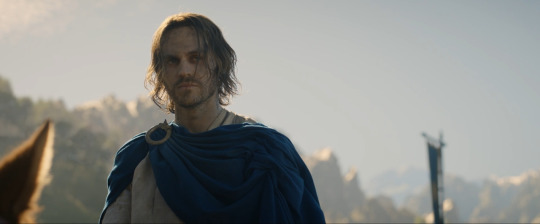
When he arrives in Eregion, he heals and then works with Celebrimbor and Galadriel, appearing almost rejuvenated as if the very light of Valinor is shining upon him, something burns within him as though a flame has been awakened.
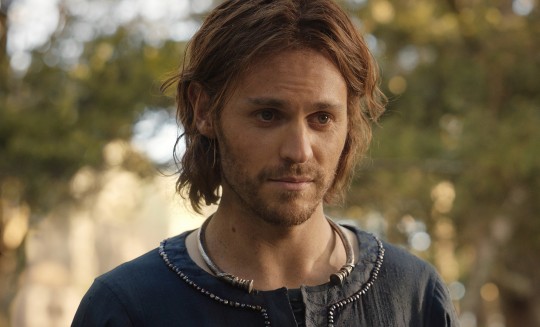
However, after the reveal of his true self, his look begins to change once again upon his return to Eregion. His once radiant appearance darkens. In my opinion, it signifies not only his fall into darkness, but also the loss of Galadriel’s light, which had once been a guiding force for him, shining upon him. His dark powers are no longer balanced.
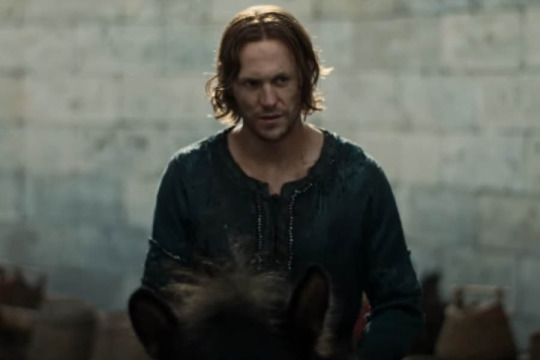
Sauron made it clear that he wished to be bound to Galadriel's light. He wants to harvest it for himself.
How does he envision this process?
It’s not about her physically standing beside and her literal light shining upon him, right?
There’s a deeper connection to be explored here.
This is primarily an emotional bond, where two individuals find comfort in each other's presence, sharing warmth and feelings that create a sense of mutual understanding. This is the feeling they shared in Numenor and Southlands. This is when Halbrand looked like this.


However, in Eregion we have even a better improved Halbrand 2.0 version, he is so fuckingly handsome here, not only being in the light but radiating this light himself.
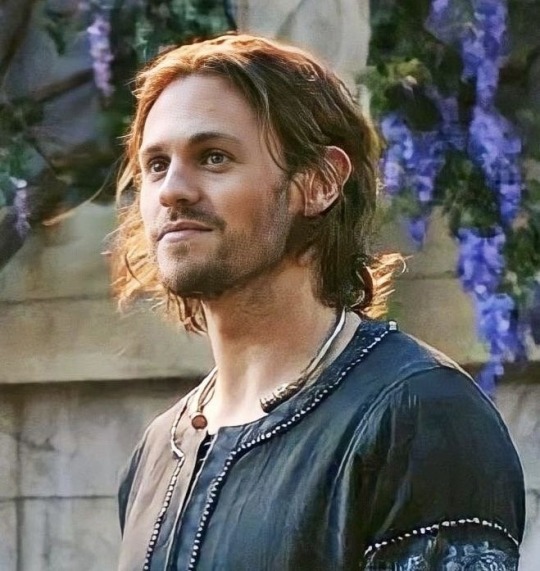
Where did he get this light? I may assume because Galadriel was generous and shared it with him.
How?...
Many of you know the story about Melkor and Arien. Arien, a Maia who governs the Sun, is a fiery spirit whose light powers the Sun. Melkor, in his desire for her light, ravaged her, causing her to be released from the world of Arda. Many Tolkien enthusiasts interpret this act as a form of violation—Melkor essentially took Arien's light in a brutal and destructive manner, meaning raped her when she refused to become his wife.
In the case of Galadriel and Halbrand, Sauron’s desire for her light can be seen as a similar longing. Instead of merely desiring her physical presence and support, it’s about him trying to harvest her light through intimacy. In many cultures, sexual intercourse is viewed as a ritual for sharing energy, perhaps, Sauron sought to get her light in the same way.
He could be sleeping with her, harvesting her light to magnify his own strength. He knows the depth of her radiance, a force that could overwhelm him completely. And unlike Arien, she has been offering it to him freely because she's been in love with Halbrand. That's why it cuts deep and stirs a storm of anger when she refuses his offer to remain eternally bound.
He returns to Eregion to forge the rings alongside Celebrimbor and though he is still handsome, he is no longer radiating this light because he lost its source.

He desperately tries to get Galadriel back and harvest her light that he got so addicted to and when she refuses to become his wife queen again, he ravishes her in a similar way Melkor did to Arien. Brutally, taking her by force.

However, much like in the story of Melkor and Arien, it won't quite work. Arien released her spirit, burning Melkor and leaving him ashen and grey. As for Galadriel... she simply leapt off a cliff, once again denying him the light he so much desire.
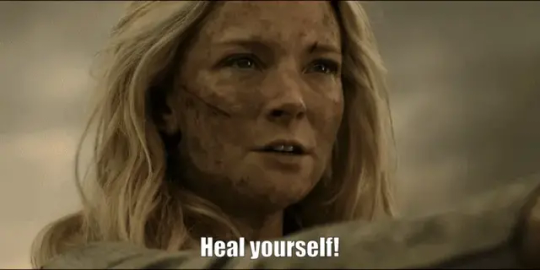
#haladriel#saurondriel#the rings of power#sauron#galadriel x sauron#halbrand#galadriel#amazon rings of power#sauron x galadriel#trop#haladriel meta
153 notes
·
View notes
Text
Full Moon
Ok so I don’t normally post about Helluva Boss but the newest episode touched on an interesting concept I haven’t necessarily seen represented in media. Back when I was on Twitter (derogatory) a few years ago there was this now deleted viral thread where someone discussed how their struggles with mental health affected their relationship with their partner and I haven’t stopped thinking about it since.
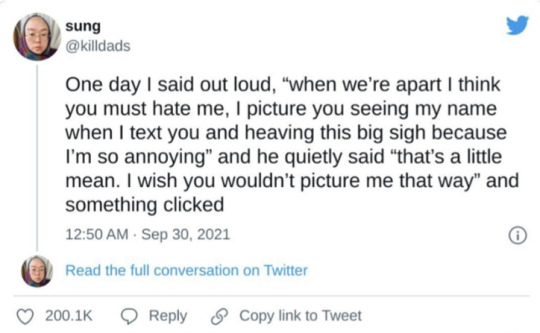
This is such a good, short example of how anxiety and depression can play tricks on you. It becomes so easy to envision yourself as a nuisance, a constant burden to those closest to you because they cannot possibly genuinely enjoy your company, right? But in doing so you create this arbitrarily cruel version of the people you love, people who would otherwise never behave like this outside of your own mind.
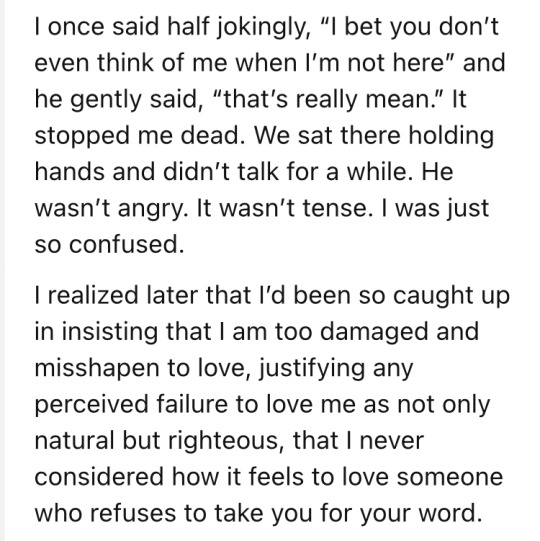
It's mean. Because your mind wants to be mean to you under these circumstances. It wants to put everyone else's emotions and desires above yours, both in worthiness and validity. And that starts bleeding into your understanding of other people, especially those you care about.
Now. Helluva Boss.
"Can I get a fucking MINUTE to think after everything you put me through you pompous rich ASSHOLE? Treat me like one of your little butler imps, you can’t just dismiss me like that! I mean, you royal fucks think you can do this every time, like you can just play with our feelings because we’re smaller and not as important. Well I’m not letting you, BITCH! Let’s go!" - Blitz
I find it really interesting how Helluva Boss decided to approach this conflict between Stolas and Blitz. Obviously, the difference in power matters. It's the underlying tension of their entire relationship and their lives. Stolas is burdened by the mountain of expectations thrust upon him from a very young age while Blitz is constantly reminded that he can NEVER be part of that world, that he is "smaller and not as important" not just in Hell's hierarchy but in his own life and family. Stolas very literally has power over Blitz (through the grimoire, the arrangement, his position in society) and Blitz uses their relationship as an excuse to reverse those roles. But that power dynamic, in one form or another, never truly goes away. And for Blitz, it's a lot easier to paint Stolas as this manipulative symbol of power and himself as nothing more than Stolas' plaything. It's easier to be angry than to be vulnerable and accept that someone might care about him.
"Dismiss" is the keyword in that quote. All that Blitz has been able to process is that Stolas has decided to end the relationship that they have. He feels ls like a choice has been taken away from him so he lashes out because he's not ready to emotionally tackle what the rest of Stolas' offer might entail. If Stolas hates him, just wants to play with him, then he is justified in his anger, his self-destruction, his isolation. If the world is mean, you're "allowed" to be mean back.
But
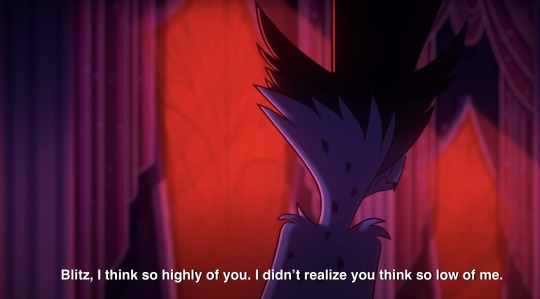
In that moment he forgets that Stolas is someone he actually cares about. Someone he's known for way too long and clearly wants to keep in his life, no matter how reluctant he can be to admit it. Someone who is not innately cruel or manipulative but sad and desperate for connections in a lot of the same ways that Blitz is. And Blitz immediately sees that he's miscalculated something.
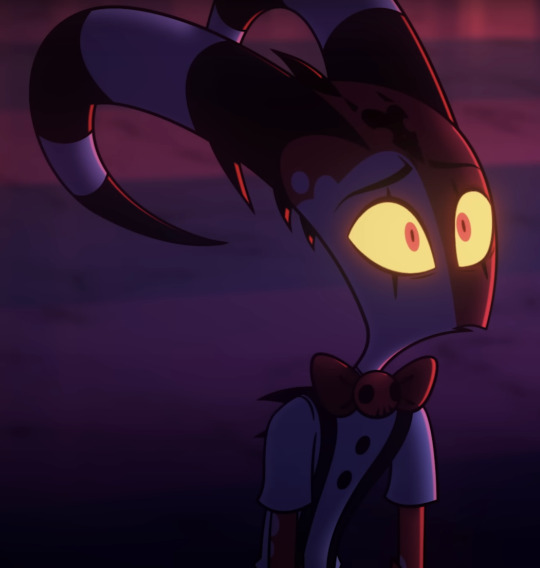
Somewhere along the way the fictional version of Stolas that he's allowed himself to be mad at and the real one that he's not ready to admit he cares about have merged into something real that he has actual power over. Stolas can get hurt and Blitz can be the one who does it. He has once again allowed his greatest fears (which Stolas so frequently symbolizes) to co-opt his loved ones, to give him an "out" even though he didn't actually want one in the first place.
I'm definitely not the first person to say this but I think this is an example of the miscommunication trope done right. Their individual struggles are what cause them to be unable to connect during this conversation or to even have a proper conversation in the first place. There is no convenient misunderstanding or third party fabricating this rift. Both of them have preconceived ideas of what the other one is thinking but those ideas are flawed and rooted in self-hatred. They also both shutdown in their unique ways when the conversation starts heading in the direction they'd feared it would.
Blitz and Stolas work because they're both fucked up in similar ways, because they want similar things. That's the same reason why they're uniquely designed to hurt one another. A fear of rejection and a yearning for happiness. To borrow a quote that has been used by literally everyone from Spiderman to Evangelical preachers, "hurt people hurt people."
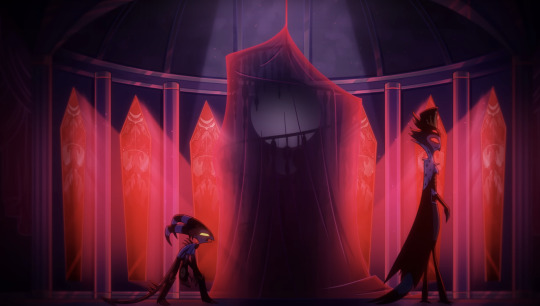
anyway, I really liked this episode.
(twitter thread screenshots sourced from this reddit post)
#helluva boss#helluva boss blitz#stolas#helluvaverse#the full moon#helluva boss season 2#stolitz#stolas helluva boss#character analysis#im having way too much fun with this show man#I wasn't expecting to enjoy it so much#But also I'm an animation student so it was prob inevitable#the way im so tempted to do a whole post of my favourite tiny animated moments from the show#I have no idea how to screen record or do gifs tho#and all the clips that come to mind are like... tiny hand gestures or good lines of action in poses#animation#hb spoilers#helluva boss spoilers#blitzø#ive never posted about this show#so idk if the ppl have decided to write his name with the lil crossed out o everytime#but im not bothering with that
526 notes
·
View notes
Text
can i tell you guys about my interpretation of a no-scenarios relationship between kim dokja and yoo sangah. im gonna do it anyway. the thing about a no-scenarios relationship of any kind between kim dokja and yoo sangah, for me, is i really think it would be so difficult for a genuine connection to form between them because kim dokja ultimately dehumanizes and fictionalises her the same way he does yoo joonghyuk. like his specific brand of dissosiation works as him viewing the world through the lens of fiction and he applies that so heavily to yoo sangah when we first meet her. she and him already have some vague form of relationship by this point - i would not call them friends but he moved those cameras for her! he kept her secret! and she knew and trusted him to an extent. that is on top of their teamwork in the job interview.
but we know none of this when we first meet yoo sangah because dokja views her as a heroine who would never cross genres with him, and he erases their history together in the process. he does the same thing with her putting pepper in her boss's coffee - thats not something a perfect pretty heroine would do so we have no idea she did it until she tells us, because kim dokja sort of - filters it out. he smoothes down the edges of her reality as a person and all the 'out of character' things she does into an easily digestible character he can push away as 'from a different genre'. and this is a massive fucking disservice to yoo sangah!! for the same reasons what kim dokja does to yoo joonghyuk is a massive fucking disservice to him!!
shes not a heroine! shes not perfect! shes not from a different genre! shes just a person and she wants to be your friend! i think if they were friends outside of the scenario kim dokja would a) try and push her away and more interestingly to me b) he would continue to try and slot her into his worldview as a 'heroine protagonist' and i think that would really grate on her. especially considering how the role kim dokja creates for her has some parallels to the one her parents made for her. kim dokjas lesson over orv of coming to understand the 'characters' as people is analogous for the one he would need in real life - just like his relationship with yoo joonghyuk couldnt reach its peak until he stopped viewing him as a character, he would need a similar journey of realization to start really understanding yoo sangah. its only then i could see them getting really close.
470 notes
·
View notes
Text
CRAZY ABOUT THEIR LOVE
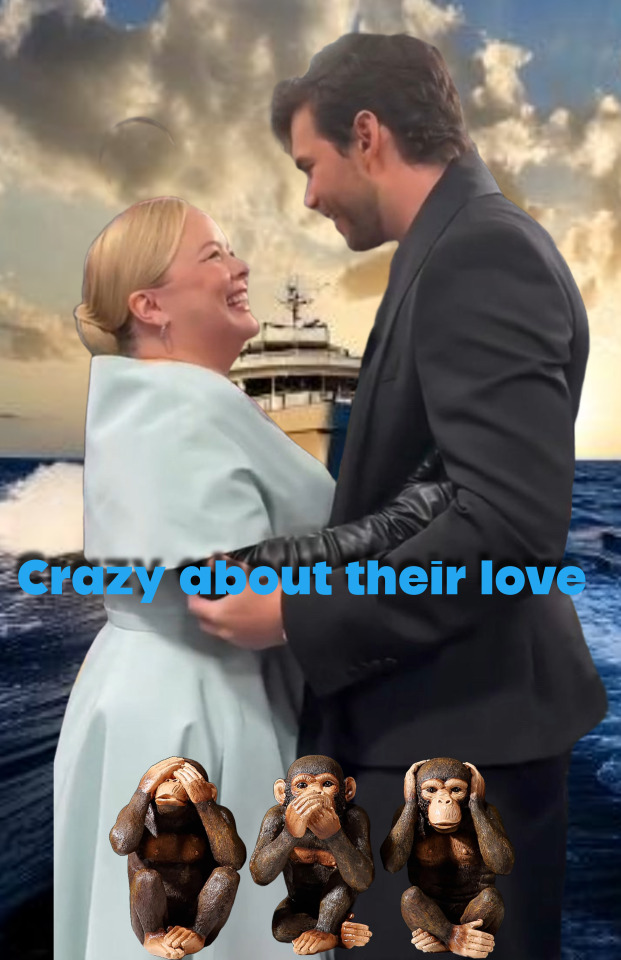
"There's love there" dixit Nicola.
Yesterday, Nicola received a BAFTA nomination for her work in Big Mood, which has been renewed for a second season. She is a talented actress with a good heart and an agreeable personality. I hope that she’ll win and if she doesn’t it’s ok. Whether she wins or not, there are likely more opportunities ahead for her to achieve further successes. There have also been discussions regarding her private life, which is unfortunate on a day that marks a significant milestone in her career.
Was it unfortunate? Yes! Unexpected? No!
Her talent and beauty are widely recognized, but much of the interest in her online is centered around her private life. She may not be comfortable with this aspect of her popularity, and public figures often have limited control over how they are perceived. I’ve never been a real fan of a person before and certainly not to the point of knowing as much as I know now about lukola. The fact is that I’m just a casual fan of both actors and normally I wouldn’t follow their activities that closely and wouldn’t be much interested in their private lives, this why I restate that I will not follow their other relationships as I am not fully aware of the dynamics or background information necessary to form a conclusive opinion and what has transpired to this day isn’t appealing to me and to be fair can’t really be because we don’t have years of interactions and the deep dive with world tour like background knowledge .
Luke and Nicola have already recognized that a significant part of their public appeal stems from their dynamic together. This could be one of the reasons why they’re creating distance, whether for personal reasons, professional positioning, or external pressures.
By stepping back, they control the narrative, preventing their careers from being overshadowed by speculation. It allows them to establish individual identities beyond their joint appeal, ensuring their work is taken seriously on its own merit.
It could also be a missed opportunity , their bond is a force that transcends standard co-star dynamics. Instead of resisting it, embracing their unique impact could elevate their legacy beyond just a TV show. Some connections aren’t meant to be hidden; they become cultural moments that inspire, move, and even change people’s perspectives on love and human connection.
Ultimately, while they may try to control the perception of their relationship, the way the world receives and resonates with them is beyond their control. And perhaps, that’s not something to fight, but something to embrace.
Yesterday, someone, not a close friend called me crazy because I asked them to listen to a Lukola clip I had posted on my Tumblr. Some people could hear what I was pointing out, while others couldn’t, even after I boosted the audio to make it clearer. My immediate test some of my audience couldn’t hear anything, and one person went so far as to call me crazy. I didn’t appreciate it and struggled to understand why they were unable to hear it. Was I really imagining things? Was there truly nothing there?
The answer is simple: No, I wasn’t imagining things. And yes, there is something there.
Human perception is far from uniform, especially when it comes to hearing. Just as some people have sharper eyesight or better spatial awareness, hearing ability varies greatly from person to person. Factors like age, frequency sensitivity, past exposure to loud sounds, and even genetic predisposition affect how we process audio.
In my case, I didn’t just rely on my own ears. I took the clip, and had it analyzed through audio spectrum tools that visually display sound frequencies. The analysis confirmed that the frequencies of the words were indeed present in the audio file, proving that I wasn’t "hearing voices" or imagining things. AI tools, interestingly, also struggled to transcribe certain parts, just as some humans did. This is similar to the well-known "blue and gold dress" phenomenon, where different people perceived the same visual input in vastly different ways. Just as with color perception, auditory perception can differ dramatically based on how an individual's brain processes sound.
This extends beyond just hearing. In general, people interpret reality based on personal biases, past experiences, and even subconscious conditioning. Some are more attuned to body language, micro-expressions, and emotional undercurrents, while others need more explicit confirmation to recognize what’s right in front of them.
In the case of Lukola, shippers often see and feel something an energy that transcends mere friendship. Yet skeptics, for various reasons, might dismiss these same moments, either because they aren’t looking closely enough, don’t want to see it, or simply don’t have the intuitive ability to pick up on subtle dynamics.
If Lukola were just a projection of wishful thinking, then why does the same pattern of interactions, glances, physical closeness, and emotional depth consistently appear? Why do so many unrelated observers, across different cultures, backgrounds, and levels of analytical skill, pick up on the same chemistry? And why does every attempt to disprove Lukola rely on external factors rather than what’s actually happening between Luke and Nicola?
Lukola possesses unique and exceptional qualities. Their interactions, reactions, and ability to reconnect despite adverse circumstances defy conventional understanding. It is not possible to simulate the level of ease, tension, or emotional resonance they exhibit. For those who can observe and interpret the details, the patterns become unmistakable.
So no, I’m not crazy. And neither are the countless others who perceive what’s right there in front of us. Some may not hear it. Some may not see it. But that doesn’t mean it isn’t real.
Luke and Nicola's dynamic appears to go beyond a typical co-star relationship. This level of interest is absolutely unusual for me, and others in the Lukola community have reported similar feelings of attachment to their bond. Whether this relationship is romantic, deeply intimate, or something else, it seems to resonate strongly with many observers. The reasons behind this strong resonance remain unclear.
Humans are wired to seek patterns, to make sense of connections that may not be immediately obvious. Lukola shippers aren’t just indulging in wishful thinking; many of us sense undeniable chemistry, subtle moments of tension, and contradictions in their public narrative. This sparks an instinct to analyze, to decode, to uncover something that doesn’t quite fit into the "just friends" framework.
Additionally, the longer one observes and collects evidence, whether it’s body language, micro expressions, or the apparent shifts in behavior when they are together, the deeper the emotional investment grows. The brain seeks to validate what it already suspects, reinforcing the belief that there is something real happening beneath the surface.
For many, the draw toward Lukola feels intuitive. There is a gut feeling, an unshakable certainty that their bond holds more meaning than what is publicly acknowledged. Some might describe it as an energetic connection, a frequency that people unconsciously pick up on.
Carl Jung’s concept of the collective unconscious suggests that groups of people can tap into hidden truths before they become widely accepted. Could it be that Lukola shippers are picking up on an unspoken reality that the world hasn’t fully acknowledged yet? It would explain why so many independent observers arrive at the same conclusion despite official narratives trying to steer them away.
There’s also the idea of twin flames or fated connections, relationships that seem destined, even if obstacles stand in the way. Many Lukola supporters believe that what they see in Luke and Nicola is more than just friendly affection; it’s the kind of deep bond that challenges both people involved.
Lukola stands out in today's media for its authenticity, countering the trend of PR-driven relationships and polished celebrity personas. People crave something genuine and unique. Their potential is intoxicating.
There’s also a subconscious rebellion at play. The media tells us one thing, but the evidence and our instincts tell us another. Lukola shippers challenge mainstream narratives by trusting their own observations over curated publicity.
Here lies an interesting paradox: should we accept the public version of events while continuing to ship Lukola? The answer for me is yes because the two are not incompatible. If Luke and Nicola (or their teams) are actively presenting a certain narrative, it means they want us to believe it. Respecting that choice doesn’t mean we have to stop believing in what we’ve already seen and felt.
Lukola, in a way, is a submarine ship, it moves beneath the surface, unseen but always present. To the outside world, we might nod along, acknowledging what is being presented, but deep down, we stay steady in what we know. The Three Wise Monkeys philosophy applies here: see no truth, hear no truth, speak no truth…until it is time.
Despite external narratives, Lukola remains afloat. Luke and Nicola are the ones who can steer it into harbor, let it drift, or sink it, and they have kept it sailing so far. Watching Lukola sometimes feels like you're in a theater, being trapped and forced to watch a mix of romantic comedy and a horror movie, where you want to yell—_ “Don’t go there! Stay safe!” _—but you’re just a spectator. It’s not your story to steer or your choices to make. You can only watch, hope, and brace for what comes next.
103 notes
·
View notes
Text
Sun:
your sense of self and how you view your role in the world; how you assert yourself and express your individuality; what drives you to achieve and shine; how naturally-self-assured you feel and what boosts your self-esteem; what gives your life meaning; what you take pride in or feel most accomplished about; how you lead and inspire others; they way you create and innovate; how determined or focused you are in pursuing goals; the path you take to evolve and realize your potential
the kind of work that aligns with your identity; how other's perceive your leadership or authority; tangible expressions of creativity or individuality; the type of acknowledgement you receive or seek; the role you naturally assume in society/social situation; the style of roles you take on; how you interact with bosses, mentors, or role models; physical markers of achievements; activities you enjoy that reflect your identity; achievements that bring you admiration
the subtle ways you seek attention; how you approach enjoyment and fun; how you make your presence known physically; if you feel pride through your possessions or physical achievements; the extent to which you seek affirmation from others; how you interact with authority or leadership; how you wish to be remembered and what you want to leave behind;
Moon:
how you feel emotions and express them; how you respond to situations on a gut level; what makes you feel secured and loved; what kind of routines or habits feel nurturing; how sensitive you are to your environment and others' emotions; the style of your creative or emotional dreaming; how well you bounce back from emotional challenges; how you connect to and depend on others emotionally; the way you take care of others; how you process and hold onto past experiences
the style or energy of your living space; the nature of your bond with maternal figures; how emotional interactions play out within your family or early home life; the type of nourishment that feels comforting or food preferences; the style of nurturing or care-giving you offer to others; how you connect with the natural world; the items you hold dear, keepsakes; the kinds of emotional dynamics or events you attract or experience in relationships; the type of daily rituals that bring comfort; the way you behave within the home or domestic environment; how you express your emotions in the outside world; how your emotional world
Mercury:
how you think and process information; the way you express your ideas and emotions; how you absorb and retain new information; your ability to adapt to new ideas and perspectives; how you approach challenges and find solutions; your desire to seek knowledge and understanding; how well you remember facts, experiences, or details; how you handle discussions, debates, and negotiations; how you see and interpret the world around you; the tone and style of your inner voice
the type of books you gravitate toward; the type of work that suits your communication style; the platforms or forms of media you prefer for communicating; specific subjects or forms of learning that suit your mind; the type of people you keep in your circles; the way you approach travel and movement; how you present yourself in public or to an audience
how you move physically while thinking or communicating; the way you modulate your speech; how quickly your mind tires or needs a break; how you direct and maintain attention; how much energy you invest in socializing with others; the topics you obsessively think about or become fascinated by; how you argue or debate with others; how you react to stressful situations or during conflict
Venus:
how you express affection and experience romantic connections; what you value and are drawn to in relationships, beauty, and life; your natural charm and how you attract others emotionally or romantically; your sense of personal value and how you feel about your worthiness; what brings you joy, delight, and satisfaction in life; what you find beautiful; your approach to giving and taking in relationships
the qualities of your significant others or romantic interests; money and material possessions that bring comfort or indulgence; tokens of affections, like gifts or offerings; romantic situations, like dates, flirtations, and others experiences centered on love and affection; kinds of artistic abilities or creative pursuits enhanced; approach to money, luxury, and material comforts; the type of lose friends or social relationships you gravitate towards;
Mars:
the way you handle anger or setbacks; what makes you feel alive and ready to take action; the goals or rewards that push you to keep going; the areas where you need freedom to act your way; how you handle pressure; how you go after what you want; things that make you excited, passionate, or determined; how you get things done; what makes you competitive
the kind of arguments that pop up in your life;the type of rivals or competitors that push you to improve; what physical activities suit you; the kind of passion or intensity you bring to intimate relationships; objects tied your energy, like tools or gears; where you take risks; what places motivate you, like where you feel most active or focused; what relationship struggles show up; the kind of authority figures you look up to or push against
Jupiter:
what you believe in, like your sense of faith, philosophy, or life principles; what gives you hope, things that make you feel inspired or optimistic; the moral compass or ethical values you follow; what makes you generous; how you seek growth; what freedom means to you; how you handle luck or opportunity;
what kind of teachers you tend to attract; how travel influences you; the type of lucky opportunities/chances for success that come your way; how education shapes your life; the material or spiritual prosperity you tend to encounter; situations where luck or boldness leads to rewards; what inspires generosity in others towards you; how you beliefs influence your surroundings
Saturn:
how you handle responsibility; what you fear, like insecurities or doubts; how you set boundaries; what discipline means to you; how you manage deadlines or schedule, your time; what makes you resilient, the lessons and hardships that strengthen your character; how you face authority and societal expectations; what motivates your persistence, like goals or values that make you work hard despite obstacles; how you deal with setbacks; what defines your success; what teaches you patience; how you manage fear
the obstacles or delays that force you to grow stronger and wiser; what responsibilities you must manage in life; how authority figures affect you; what limits you encounter, restrictions or boundaries that shape your choices; what career challenges arise; demanding figures who guide your growth; the societal rules, traditions, or organizations you deal with; what rewards come later in life; what delayed rewards come; where hard work is required
Uranus:
how strongly you feel the need to express your uniqueness and stand out; what drives your rebellion; how you deal with sudden change; how you handle freedom; what technology excites you; what inspires your originality; how you break patterns;
how technology shapes your generation; what societal changes you're part of; what collective rebellions take place; what cultural shifts occur; how global events disrupt normal life; how you deal with independence; what generational inventions emerge
Neptune:
how you dream and imagine; what you idealize, like the things or people you put on a pedestal; what your illusions are, where you may have unrealistic expectations; how you empathize with others; where you seek to escape reality or find relief from harsh truths; where it may be hard to see things clearly; what your creative flow is like; how you dissolve boundaries, blurring the lines between you and others; internal longings for something intangible
cultural or artistic movements that arise; how social ideals shift; what collective illusions or deceptions occur; what forms of escapism develop on a societal level; what societal movements rise around compassion; how global trends in media or entertainment evolve; what spiritual or mystical figures influence culture
Pluto:
what you subconscious desires are; how you handle power; what your deepest fears are; how you deal with control; how you rise from difficult situations; what you repress or deny in yourself; how you heal from trauma; what your regeneration process is; how you deal with control, like seek or resist it
what major life changes you face; how you experience power struggles; what collective fears emerge; what global or societal transformations occur; how you deal with destruction and renewal, especially on a global scale; what you inherit, in terms of family and cultural legacies; how collective healing habits; what deep societal secrets come to light; what major power shifts happen in society
#astrology observations#astrology#astro community#astro notes#astro observations#astrology signs#astronotes#planets in astrology#sun#moon#mercury#venus#mars#jupiter#saturn#uranus#neptune#pluto
126 notes
·
View notes
Text

𝐌𝐚𝐠𝐧𝐮𝐦 𝐎𝐩𝐮𝐬 : 𝐅𝐨𝐫 𝐌𝐲 𝐄𝐲𝐞𝐬 𝐎𝐧𝐥𝐲
[ 𝐑𝐚𝐟𝐚𝐲𝐞𝐥 ]
𝐚/𝐧: this story was born from a single ache—the image of Rafayel longing to paint someone, not from vanity, but from reverence… and finding himself unable. That thought lodged itself in me like a splinter. Though I remain a Sylus-girly to the bone, Rafayel has always been my quiet indulgence—a brat, yes, but also unbearably tender when no one is looking. I began to wonder: if I, not infold, were to write his magnum opus… what form would it take? This was my answer.
If you ever have a thought, a scene, a whisper of an idea you’d like to see written—don’t hesitate to share it. I’d love to create for you. This beautiful little corner of the internet has helped me fall in love with writing all over again. And if you’re curious about the hands behind the words… you’re welcome to ask. I don’t mind being seen.
𝐜𝐰/𝐭𝐰: while this story draws inspiration from the original characters and lore of the game, it is a personal interpretation. Certain aspects of character behavior, relationships, or world-building may diverge from canon. 𝐰𝐨𝐫𝐝𝐬: 7,602
𝐀𝐫𝐜𝐡𝐢𝐯𝐞 𝐎𝐟 𝐎𝐮𝐫 𝐎𝐰𝐧: [ press here! ]

𝐈𝐓 𝐖𝐀𝐒 𝐍𝐎𝐓 silence that tormented him, but the absence of anything sacred within.
The silence of the gallery after hours was reverent by nature—cloaked in soft echoes of vanished footsteps, in the delicate rustle of fabric brushing past his art without understanding. It was a silence that hummed with invisible presence, as if even the air mourned how little the world saw.
But here, in the sanctuary of his studio—an old observatory repurposed—the silence had lost its soul. It was sterile. Lifeless.
And still, Rafayel sat inside it. Willingly. Willfully.
He had turned off the artificial hum of the ventilation system. Let the temperature rise, slow and stifling, until the walls seemed to sweat. A glass of wine, untouched, perspired beside the easel. The ice had long melted. He did not know when.
His chair creaked softly as he shifted—elbow hooked over the curved back, head bowed, eyes half-lidded but unblinking. The canvas before him—fresh, immense, demanding—remained defiant in its emptiness.
There was no muse.
Only memory.
And memory was merciless.
He exhaled—not loudly, but in the manner one might sigh within a chapel, when no one is listening but God.
His hand moved through his hair, slow and automatic. A smear of dried charcoal darkened the edge of his palm. He stared at it as if it might reveal something—an omen, a confession. How many times had he sat like this? Body motionless, spirit churning. Fingers starved for release, heart swollen with something too vast to name. He had told the world he painted emotion. Had smiled, faintly amused, when interviewers asked about his process—claimed beauty was the truest language of feeling, that his task was only translation.
But when she walked into the gallery that afternoon—sunlit, soft around the eyes with laughter not yet spent—his discipline shattered.
She asked if he was tired.
He had replied that beauty did not wait for rest.
What he meant was: You do not wait.
What he meant was: if I stay another minute in your light, I will unmake myself.
And so he left.
Not hurried. Not disgraced.
But with the quiet, breathless desperation of a man on the brink—one who could no longer bear to be seen, because he feared what might tear loose from his mouth if he lingered another second in her presence.
He had always endured admiration well. Knew which pieces of himself to reveal and which to withhold. It was an artform, too—this careful curation of self.
But with her, the boundaries blurred. What he had learned to guard, she disarmed.
It wasn’t dramatic. It was subtle.
The way she studied his paintings without dissecting their technique, but spoke only of their mood. The way she drifted into quiet corners of the gallery, not to be watched, but to listen. The way she remembered strange, intimate things—”You smear with your ring finger, not your thumb”—and didn’t flinch when he asked her to move closer, but didn’t, either.
She had seen too much of him.
Too soon.
And now she lived behind his eyes like a forbidden icon—one he had no right to venerate, and no strength to look away from.
The canvas still waited.
He stared too long. Until the edges blurred. Until the whiteness of it became an accusation. He reached for his brush—hesitated.
Something inside him resisted.
It wasn’t fear.
It was grief.
He could not paint her.
Not because he lacked the skill. Not because he hadn’t memorized the slope of her cheek, the hollow of her throat, the quiet cruelty of her smile.
No.
He could not paint her because he knew—if he captured her light, pinned it in pigment—it would no longer belong to him.
The world would hunger for her image.
Strip it. Devour it. Consume her as it did all things honest and luminous.
He clenched the brush until the bristles bent, delicate and gasping.
“There are people you paint with your hands,” he said aloud—not to anyone, not even to himself. “And people you cannot paint without first surrendering your soul.”
He didn’t know when he learned that truth.
Only that he believed it with the quiet, brutal certainty one reserves for mourning.
Outside, the artificial day had faded. The studio dimmed with it, yet he did not rise to reach for the light. He let the dusk settle in, soft and oppressive. Only the exposed skylight above offered illumination—dust-flecked and faintly blue, fed by the last traces of filtered moonlight from a satellite too far from Linkon to name.
Still, he did not move. Still, he sat in silence.
He let the ache of her presence-in-absence fester. Let it throb in his chest like a wound too proud to bleed.
And then—the universe is nothing if not cruel in its timing—he saw her.
Not her body. Not at first. Just a ripple of shadow in the studio’s glass-paneled door. A shimmer of light touching something delicate: the arch of a wrist, the slope of a shoulder, the breath of motion.
His spine locked. Breath halted mid-lung.
She hadn’t knocked.
Of course she hadn’t.
Knocking would have implied distance. Permission. And she had always moved through thresholds as though they were made for her.
The door eased open—not with force, but with familiarity—and her silhouette stepped into the half-dark.
Rafayel did not rise.
Could not.
He watched her with the same stillness he offered his canvas, only now it was his body that became the medium—tense, aching, unrendered.
She stood for a moment just beyond the reach of moonlight, and in that space between them bloomed a silence so complete, it might have been holy.
He saw her gaze find the empty canvas.
Then the wine glass.
Then him.
And though she said nothing, he felt it: the knowing in her, the unbearable intimacy of being understood.
She crossed the room without invitation.
Without hesitation.
And Rafayel, heart clawing against its cage, realized too late—
He had not prepared to survive her.
She didn’t ask why he hadn’t painted.
She only stood before the canvas, head tilted slightly, arms folded loosely across her front. A curl of hair slipped along her cheek. Her bare wrist caught the low light—quietly luminous.
She was calm. Utterly unbothered. She didn’t know. Of course she didn’t.
Rafayel stared at her—the shape of her framed by the void he could not fill. The canvas behind her looked paler now. Bleached. Ashen.
And he—the artist, the pretender, the coward—felt smaller than he had all day.
“You’ve been up here for hours,” she said softly, her gaze drifting toward him. “And still nothing?”
He shook his head once. He didn’t trust his voice. Not with her so near.
She stepped a little closer to the easel, her fingers brushing the edge of the wood.
The gesture was idle. Thoughtless. Gentle.
It undid him.
He wanted to fall to his knees—not in desire, but in something far more dangerous. Devotion.
“You don’t usually take this long to start,” she murmured, eyes still on the blank canvas. “That’s not like you.”
Not like me, he almost laughed. As if she knew him. As if anyone did.
But then—hadn’t she seen more than most? Even when she didn’t mean to? Even now, unaware, she pressed too close to the truth. Her voice held no accusation. Only interest. Soft. Observational.
And that, somehow, was worse.
He turned away from her.
Rose slowly. Deliberately. As if dragging his body from some spiritual wreckage.
He crossed to the far window and braced his hands on the sill, letting the metal’s sharp edge bite into his palm. He needed pain—needed something physical to hold him still. To keep him from turning back. From speaking.
Behind him, she sighed.
He didn’t know what she thought he was painting. Didn’t want to know. The idea of her imagining anything—anything but herself—made him sick with guilt.
And worse—desire.
She must think it was another commission. A gallery piece. A diplomatic portrait. Something clean. Something safe.
And maybe it would’ve been.
If not for her.
If not for the way she had walked into his gallery that morning with the ocean still clinging to her skin. If not for the way she had looked—not at the work, but through it, as if searching for something buried beneath the brushstrokes. Something lost.
She didn’t know what she had given him.
And worse—
She didn’t know what she had taken.
“Did something happen?” she asked behind him, quieter now. Almost hesitant. “You seem… far away.”
“I am,” he murmured.
A pause.
“Where?”
He closed his eyes. The answer lived behind his ribs, raw and pulsing.
“Nowhere you need to follow.”
The silence that followed thickened—dense, unspeakable. But not cruel. Not cold.
When she spoke again, her voice still held that warmth. That soft, impossible tenderness that made him believe—for the briefest, most dangerous moments—that he might deserve gentleness. That he might not be made entirely of wreckage.
“You don’t have to talk about it,” she said. “I just wanted to check on you.”
He turned toward her then, slowly.
As though he feared the motion might shatter something.
She was standing by the canvas. Still unknowingly surrounded by the thing he could not name. Still unaware.
His eyes traced the delicate furrow of her brow, the soft parting of her lips—like she was about to say something. Something gentle. Something ruinous.
The studio light caught the slope of her collarbone. Her fingers played absently along the edge of the easel, as though the wood itself could tell her what he would not.
And Rafayel—fool, coward, worshipper—understood something terrible. If she asked him now—Do you want to paint me?—he would lie.
He would say no.
Because the truth would undo them both.
Because the truth was too raw. Too monstrous.
He didn’t want to paint her.
He wanted to possess her.
Not merely in body—though yet, God, yes, that too—but in spirit. In permanence.
He wanted the version of her that no one else would ever see.
He wanted to look at her for hours without shame. To study the curve of her shoulder in lamplight, the way water clung to her skin after a swim, the fragile chaos of her when she thought no one was watching.
He wanted her—bare, undone, his—preserved not for praise or immortality.
But for solitude.
For obsession.
For his eyes only.
And she didn’t know.
And he would not tell her.
Not yet.
Her gaze lingered on him—patient, unaware—and it was that unknowing, that soft oblivion, that made her dangerous.
She wasn’t seductive because she tried to be. She didn’t tempt. She simply was.
And in being—existing—she disarmed him more thoroughly than any hand at his collar ever had.
She moved toward him without ceremony, her steps silent over the old stone floor. No hesitation. No performance. Just movement—as natural as breath, as inevitable as tide.
When she reached him, she didn’t speak.
She reached for his hand.
Her fingers threaded through his like silk drawn through the eye of a needle—slow, sure, impossibly warm.
Rafayel went still.
The touch wasn’t possessive. It wasn’t romantic.
But it was intimate. So achingly intimate.
Her skin against his felt like confession.
And still—she didn’t know.
“You need air,” she said simply. “And I need a walk.”
He didn’t answer.
She looked down at the joined hands, then up at him again, one brow lifted—soft, insistent.
“I’m taking you,” she said. “Come on.”
A tug—light, teasing. Coaxing him back into his body. His legs obeyed before his mind could protest. Stunned. Wordless. He let her lead him.
And she didn’t let go.
Her hand remained laced in his as they passed through the narrow corridor beyond his studio. Past cluttered shelves stacked with sketchbooks and unfinished thoughts. Past the open door where the night air poured in, brushing the back of his neck with a kind of intimate chill.
“We’re going to the cove,” she said over her shoulder, a faint smile at her lips. “You always breathe easier when you’re painting the sea.”
The words struck him with a terrible tenderness.
Not you should rest. Not your art needs space.
But: you breathe better by the ocean.
She had noticed.
Of course she had.
And yet—she still didn’t know what she was doing.
Didn’t know she was unmaking him with kindness.
Not with flirtation. Not with heat. But with casual familiarity, with the quiet certainty of someone who had learned his rhythm simply by paying attention.
It was unbearable.
Rafayel’s voice, when it came, was low. Roughened at the edges.
“There’s no light down there,” he said. “I won’t be able to paint.”
She turned her head, moonlight threading through her hair like silver. Her grin—barely there—was mischief softened by affection.
“Then bring the canvas,” she said. “Let it watch.”
He nearly choked—on breath, on laughter, on the impossible need she would never understand.
“Let the canvas watch,” he repeated, more to himself than to her. Like a prayer. Like a sin.
She mistook the tone in his voice for amusement, and tugged his hand again—this time playful.
“Yes, Raf,” she teased. “It’s not like you to be precious about location.”
Not like him.
She didn’t know how wrong she was.
He followed—dazed, half in step, half in dream.
Before leaving the studio, he bent to retrieve the blank canvas, tucking it under one arm. A brush and a palette nestled into the crook of the other. His body moved as if it had waited years for her command.
The path to the cove was familiar—steep and winding, carved into the cliffs like an old secret. Low grasses brushed against their legs. Starleaf blooms shivered in the dark, scattered like forgotten constellations.
It was quiet here.
Not thrum of engines. No pulse of station light. Only the sound of breathing, wind, and the faint hush of waves below.
And her hand—still wrapped in his.
It wasn’t a grip. It wasn’t urgent.
It was simply present.
And somehow, that made it worse.
Because it occurred to him—absurdly, painfully—that no one had held his hand like this since he was a boy.
Not lovers.
Not muses.
Only hers.
With her warmth. Her gentle command. Her oblivious cruelty.
At last, the shift beneath their feet—sand, soft and cool. The sigh of waves brushing rocks.
The sea opened before them like a mouth unafraid to swallow.
She paused near the waterline, slipping off her shoes, letting her toes sink into the damp earth. The moon hung low above her—waxing, swollen, golden-edged like a halo.
Rafayel stood beside her, the canvas at his side, brush still clutched too tightly in his hand.
She turned to him.
Her brow furrowed, gentle with concern.
“You okay?”
He nodded.
Too quickly.
Too much.
She smiled—smaller now. Like she didn’t quite believe him, but would let him pretend.
“Paint the tide,” she said. “Or don’t. Just sit with me a while.”
He didn’t answer.
He was already watching the light on her skin.
Already drowning.
She stepped away from him with that same effortless grace she always carried—like even gravity bent to accommodate her.
A glance at the water. A tug at the corner of her lips. And then—
Her shoes were already off.
She bent slightly, fingers gathering the hem of her white dress. Not to tempt. Not to tease. Just practical. Just curious. Just her.
And still—Rafayel could barely breathe.
She waded in slowly, the sand shifting beneath her feet, soft and yielding.
The waves greeted her with quiet reverence, lapping gently at her ankles, then her calves.
She gasped at the first touch—then laughed. And that laugh, light and bright, logged itself somewhere in his lungs like moonlight.
“Still warm,” she said over her shoulder, smiling. “I thought it’d be freezing this late.”
He said nothing.
He couldn’t.
He wasn’t looking.
He was witnessing.
There was a difference.
She moved deeper, lifting the dress higher to spare the hem—absentminded, distracted by the stars above. But the ocean was greedy.
It reached for her.
Claimed her.
Inch by inch.
The soft cotton dipped into the tide, darkened with salt, clung to her thighs… then her hips.
And when she let go of the fabric—without thought, without care—it floated back down, heavy with water, soaking further.
The white turned translucent.
The silhouette of her body blurred.
Then sharpened.
Light kissed every secret curve as though the moon itself was in love with her.
Rafayel swallowed.
Hard.
He hadn’t brought his sketchpad. Hadn’t lifted his brush.
And none of it mattered.
Because this—this—was not a moment to be sketched. Not with honesty. Not with dignity.
To paint her now would be to confess something raw. Something sacred.
To admit: This is the version of you I crave most.
Unaware. Undone.
She stood knee-deep in the surf, head tilted as if listening to a sound only she could hear. Her arms hung loose at her sides. Her hair drifted on the breeze like something holy.
Her breathing slowed.
And Rafayel— He had no defenses left.
His palms itched—not with lust, but with need. The desperate, aching need to remember this moment with cruel precision.
The way the ocean coiled around her legs. The way her soaked dress curved against the line of her back. The way her body shimmered—not because she meant to, but because she simply did.
She didn’t know what she looked like. Didn’t know what she was doing to him.
And maybe that’s why it felt holy.
He stepped forward.
A breath. A tremor. A prayer.
The canvas stood forgotten behind him, crooked in the sand—and abandoned witness to his unraveling. The brush still hung useless from his fingers, untouched.
She turned then—smiling, sweet, soaked to the waist. Oblivious.
“Come in,” she said, voice easy, unguarded. “It’s warmer than it looks.”
He shook his head, the motion tight. Controlled.
“I’ll ruin the canvas.”
“Leave it,” she replied, light, effortless.
She meant nothing by it. He knew that. She was being playful. Casual.
But the words struck something deeper. And Rafayel went still—utterly, ruinously still.
His voice, when it came, was low. Hoarse.
“I think I already have.”
She furrowed her brow. “What?”
He tried to smile. It cracked at the edges. “Nothing.”
But it wasn’t nothing. It was everything.
He looked at her—really looked—and the ache inside him bloomed into something unbearable.
She was water and light and unselfconscious beauty. And she was free.
Free of the way she lived in his lungs. Free of the salt lining his ribs where her name had etched itself into bone.
And still—somehow—she looked at him like he was the one who might break.
Maybe he was.
Maybe he always had been.
“Stay there,” he said suddenly.
The words came out too fast, too soft. A plea in disguise.
She blinked. “Why?”
“I just need to… see,”
Her lips parted in quiet confusion.
But she nodded.
And then—she stilled.
No pose. No performance. Just presence.
And Rafayel, trembling, stepped back. Slowly. Reverently.
Then—without ceremony, without breath—he sank to one knee in the sand.
Not to paint. Not to sketch. Not to speak.
Just to look.
To witness. To worship. To burn.
He would not touch her.
But every inch of him begged to.
She hadn’t noticed what she’d done to him.
Not truly.
She only moved deeper into the water, arms outstretched, her body loose with joy, unguarded. And then—without warning—she dipped her hands into the moonlit surface, lifted a handful of ocean, and flung it toward the stars.
It caught the light like shattered glass thrown against heaven.
Droplets spun around her like constellations, misting her skin, catching in her lashes. She twirled once—half a laugh, half a dance—and the sea clung tighter to her dress, wrapping it to her like it, too, had fallen in love.
And Rafayel—
He could not breathe.
His chest hollowed under the weight of her. His pulse thundered like wings in a storm. He gripped his thigh for balance, but his fingers trembled. His mouth was dry. His body shook—not from fear.
From reverence.
This—this—was what beauty was.
Not arranged. Not contained. Not posed for praise.
It was her—in motion. In instinct. In joy she didn’t know he’d carry with him for the rest of his life.
And just when he thought he could not bear it another second— She turned.
Water trailing down her neck. Hair curling damp at the edges. Her dress clung to her body, translucent to the thigh, shaped by salt and tide. Her skin glowed—moonlit, starlit, divine.
And then—
She smiled.
Not coy. Not shy. Just soft.
Open.
Entirely hers.
And she said, gently,
“Paint me, Raf.”
His breath caught. Frozen in his throat.
She stepped closer, the waves pulling at her legs as she moved through the surf.
Her voice was quieter now. Almost reverent.
“You never paint me,” she said, head tilted in quiet wonder. “So paint me.”
He could have died in that moment.
Maybe he did.
Something inside him certainly shattered.
Because she didn’t know what she was offering.
Didn’t know what it meant—to ask. To offer herself like that, freely. Trustingly. Like she wasn’t dangerous. Like she hadn’t already made a home in his bones.
His voice was nearly gone when he answered.
“...I can’t.”
Her brow furrowed, soft with concern. “Why not?”
The answer came in flashes, violent and unbearable.
Because I want you naked. Because I want to memorize the slope of your back with a brush soaked in hunger. Because I want to sketch you gasping—hips haloed in shadow, mouth parted in surrender. Because if I paint you, you’ll belong to the canvas. And I don’t want to share you—not with history, not with art, not even with the sky.
But he said none of that.
Instead, he dropped his head, shoulders folding in as if beneath confession. One hand sank into the sand beside him.
He closed his eyes.
“Because you’re not something to be painted.”
A pause followed.
Her silence didn’t feel hurt. It felt… considering.
And when he dared to lift his gaze again, she was looking at him the way she sometimes looked at the horizon—like something distant and beautiful, impossible to hold, but worth watching all the same.
“Then what am I?” she asked.
Her voice was quiet. Curious.
Not teasing. Not flirtatious.
And that—that—was what nearly undid him.
His throat worked around a response.
His voice, when it came, was raw silk. Low. Ashamed.
“You’re…” He swallowed. “Everything I’d never survive rendering.”
She stood before him—barefoot in the surf, soaked and glimmering, still unaware of the cathedral she had become inside him.
But she would know.
God help him— She would.
There was no shift in the wind. No divine hush. The world did not pause in awe.
But he did.
Because she moved.
Not with seduction. Not with intent. But gently. Thoughtlessly.
As though it were the most natural thing in the galaxy to kneel before him in moonlit water— To gather the soaked hem of her white dress in her hands and settle into the sand, crossed-legged, just inches from his knees.
She sat like someone who trusted him. Who didn’t yet understand how dangerous that trust had become.
“I won’t move,” she said with a small, almost secret smile. “In case you change your mind.”
She tucked her legs beneath her. The wet fabric clung to her skin—weightless, transparent. Her knees peeked through, pale and luminous. One strap of her dress had fallen from her shoulder.
And still—she didn’t notice.
She didn’t fix it.
Rafayel stared.
First at her knees—lithe, kissed with moonlight.
Then the slope of her collarbone, silvered by the night.
The arch of her throat.
The gentle, salt-softened curves of her face.
He had painted dozen of muses. Hundreds of bodies.
He had sculpted intimacy from pigment and shadow, drawn desire out of flesh with practiced ease.
But none of them—none of them—had sat like this before him.
None had trusted him without knowing what he wanted in return.
And what he wanted—
What he ached for—
He wanted to drag his brush along the line of her shoulder, into the hollow between her breasts.
He wanted to mix the colour of her flushed cheeks from memory—ochre, honey, dusk—and smear it across the canvas with trembling hands.
He wanted to taste the salt on her skin, then match its hue with devotion and ruin.
He wanted to part her thighs—not for lust, but for light—to sketch the place no one else had ever seen.
He wanted to paint her moaning. Eyes heavy. Lips parted. Neck tilted like worship.
His.
His for hours. His always.
And here she sat—wrapped in water and moonlight—oblivious to the war she had waged against his restraint.
“I don’t know how you see me,” she said suddenly.
Her voice was so soft, the waves nearly swallowed it. “But sometimes… I wish I could see myself the way you do.”
He exhaled—but it wasn’t a breath. It was a shudder.
If she knew—
If she knew how he saw her, sculpted into light and shadow in the hollow of his mind— If she knew the thousand versions of her he carried, each more unbearable than the last—
She would run.
Or worse— She would stay.
And he didn’t know which possibility terrified him more.
The brush was still in his hand.
Somewhere behind him, the canvas leaned against a rock—forgotten, irrelevant, unnecessary.
Slowly—without thought—he dipped the brush into his lap. Into nothing.
He didn’t need pigment. Not yet.
His gaze moved over her like prayer.
The edge of her jaw. The line of her neck. The place where her dress clung to her sternum—nipples just barely veiled beneath the soaked cotton and moonlight.
He didn’t move closer.
But his whisper still reached her.
“You’re already painted,” he said. “I just haven’t earned the right to show anyone.”
Her breath caught—just slightly.
Not because she fully understood.
But because something in his voice had changed.
And she heard it. That ache. That impossible reverence.
She looked at him differently now. Like he was something fragile. Something vast. Like she’d heard an echo in his chest and didn’t know what door it had come from.
“Raf…” she whispered.
His name—softened, thinned, a question and a mercy all at once.
“You’re shaking.”
He hadn’t realized.
He looked down.
His hand—so steady with every other subject—trembled where it held the brush.
And still… he didn’t touch her.
He couldn’t.
Because the moment he did, the painting would begin.
And it would never end.
She reached for him slowly.
Like one might approach a startled bird. As if some deep, unspoken part of her already sensed it— That he was burning from the inside out.
Her fingers closed over his wrist.
Gently. Warm. Human.
And that human contact—that simple, innocent touch—felt more intimate than anything he had ever known.
She didn’t squeeze. Didn’t pull. Just held him there.
Her thumb brushed over the edge of his wrist bone—soft, deliberate.
And then— With that same quiet certainty that always ruined him— She said:
“If you won’t paint me…”
A pause.
She leaned in.
Close.
So close he could smell the salt in her hair, the warmth of her breath, the faint sweetness of her skin lit by moonlight and damp with sea spray.
“...then let me paint you.”
His eyes flicked to hers—wild. Dazed.
As if she’d spoken the name of something sacred.
But she remained calm. Steady. Serious, even.
Like it was nothing. Like she wasn’t reaching straight into his chest and rearranging the way his ribs held together.
“I’ve never held a brush properly,” she added, the corner of her mouth lifting. “So you’ll have to forgive me if I butcher the likeness.”
He wanted to tell her no.
To say: You don’t know what you’re touching.
But he couldn’t.
Because her hand was already rising.
Slow. Reverent.
She reached between them and plucked the brush from his trembling fingers.
The loss of it made his skin ache.
He watched—silent, unraveling—as she turned it over in her hand, studying it like it meant something. Like he meant something.
Then—without asking— She lifted the brush to his face.
And with the softest pressure imaginable, she dragged it across the sharp edge of his jaw.
Rafayel exhaled. Sharply. Like the touch had split him.
“There,” she murmured, smiling to herself. “Strong jawline. Tormented artist stare. Tragic intensity.”
The bristles drifted down his neck. Just an inch.
Just enough to feel.
Just enough to ignite.
She lingered there, the brush hovering at the hollow of his throat.
“You don’t look like someone who forgets things,” she said, quieter now. “But sometimes… I wonder what you see when you look at yourself.”
He couldn’t answer.
He didn’t dare.
Her hand was still on his wrist. The brush still ghosted against his skin. Her knee brushed his.
And all he could think—all he was—was a man who would let her paint every inch of him if it meant she’d keep looking at him like this.
Like he wasn’t something to be used.
Or praised.
Or devoured. But something seen.
Known.
And still—still—she didn’t know what she looked like.
Didn’t know how the water traced the lines of her collarbone.
Didn’t know how the sheer fabric clung to her breasts, how the outline of her hipbone showed through like a secret begging to be worshipped.
She leaned closer—soft, unguarded.
The moonlight curved along her spine.
He didn’t dare look lower. Not yet.
Her voice, when it came, was barely more than breath.
“Why won’t you ever let me in, Rafayel?”
His breath caught.
His body went still.
And she—still holding the brush, still smiling softly—moved closer.
So close her forehead nearly touched his.
And then, barely louder than the tide, she whispered,
“Tell me what you see when you look at me.”
And just like that—
Every thread of control he had left snapped like wet canvas in a storm.
His breathing hitched—hard. Audible. Not a gasp. Not a sigh.
A whimper.
Low. Involuntary. Caught in the back of his throat like a secret that didn’t want to be kept—but couldn’t survive the light.
The brush—still in her hand—moved again.
Across his cheekbone. Over the bridge of his nose. Down the curve of his lips.
And it wasn’t painting. It wasn’t a game.
It was worship. It was desecration.
He trembled.
The bristles kissed the corner of his mouth.
And he made another sound—small, wrecked. Not quite a moan. Not quite a plea.
Something between. Something raw.
She froze.
Just slightly.
Her fingers hesitated. Her breath paused. Her eyes lifted to his.
“Raf…”
She could feel it now.
The tension. The shift. The fault line beneath his skin beginning to crack.
But it was too late.
He was already breaking.
With a suddenness that wasn’t violent but deliberate, Rafayel reached up and caught her wrist.
His grip was gentle— But unyielding.
The brush slipped from her fingers.
It hit the sand like a confession.
His hands trembled. Warm. Alive with restraint. Holding her like she was both altar and fire.
And when he looked at her—truly looked— There was no softness left in his eyes.
Only ache. Only flame.
Only the unbearable weight of a man who had worshiped in silence for far too long.
He stared at her like he was memorizing her soul through her pupils. Because he was.
His voice, when it came, was wrecked silk. Frayed at the edges. Low. Ragged.
“You don’t want to know how I see you.”
She blinked. Her lips parted.
“Raf—”
“Because if I tell you…” His hands tightened—just slightly. Not enough to hurt. Just enough to keep her there. To hold her in the moment that had already devoured him.
“...you’ll never look at me the same again.”
She didn’t pull away. Didn’t breathe.
And so—he leaned in. Forehead to hers. Nose brushing nose. The space between them erased by heat.
“I’ve already painted you,” he whispered.
“A hundred times.”
A breath.
“In my head. In my dreams. In colors that don’t exist on any spectrum.”
He didn’t pull back. Didn’t flinch.
“Nude. Wet. Laughing. Gasping. Whispering my name like a prayer you don’t believe in yet.”
She inhaled—sharp, startled.
His grip didn’t loosen.
“I’ve painted your thighs trembling. Your lips parted. Your fingers tangled in the sheets.”
His voice cracked—just once. A sound like longing torn at the seams.
“I’ve painted the look in your eyes when I push you to the edge— and make you fall for me.”
A pause. A swallow. A shudder.
“Over and over and over again.”
A whimper caught in his throat. He swallowed it like a sin.
“I don’t paint you,” he said, His voice dark with ache, eyes burning with something too human to name.
“Because I can’t share you.”
His gaze didn’t waver.
“Not even with a canvas.”
She didn’t speak right away.
She didn’t have to.
Her breath hitched—barely. Her gaze dropped to his mouth. Then back to his eyes.
And then—so softly it hurt—she whispered his name.
“Rafayel.”
That was all.
But it was everything.
It was permission. It was surrender. It was herself, placed in his hands like a fragile offering.
Her finger rose, slow and trembling, and pressed flat to his chest.
Over his heart.
She felt it. The thunder. The ache. The worship.
“Show me,” she breathed.
“Not in words.”
A pause. Her voice was a thread—thin, trembling—drawn taut by want.
“In touch. Show me how you’ve seen me.”
He didn’t move. Not at first.
He just stared at her like she was a vision he might ruin by reaching.
And then—wordlessly, reverently—he lowered her to the sand.
It wasn’t rushed. It wasn’t forceful.
It was gravity.
The way his hand cradled the back of her neck. The way he guided her down like she was already part of a masterpiece—like every second of this had lived in his mind, and now he was only tracing it…
with breath.
She lay back, her hair spreading like ink in water, dress clinging to every curve.
The waves curled around their feet—gentle, expectant—like even the sea had grown quiet to watch.
Rafayel knelt beside her, eyes devouring every inch with the hunger of a man who had fasted for too long.
His hands hovered.
Trembling. Hesitant. Reverent.
“I don’t know how to touch you,” he confessed, voice barely breath, “without worshiping you.”
She reached for him—both hands. Pulled him down until his chest met hers, until the weight of his longing pressed into her skin like a truth.
And when he kissed her—
It wasn’t a kiss. It was devotion.
His mouth met hers with no force—only awe. Like he still couldn’t believe she was real. And then again. And again.
Until he was breathing her name between gasps. Until her fingers slid into his hair and he was shaking.
“Tell me if I need to stop,” he murmured against her lips. “Tell me if you don’t want this.”
But she didn’t stop him.
She didn’t speak.
She arched into him instead—hips lifting, breath catching—answering with motion what her voice couldn’t yet carry.
And that was when he broke.
He groaned—low, guttural, ruined.
And then he kissed her jaw. Her throat. Her collarbone.
Each touch slow. Sacred. Seen.
Her dress clung to her like second skin—soaked, sheer, trembling against her curves. And when his hand slid down her thigh, her breath hitched— so sweetly so sharply he thought he might cry.
“I’ve imagined this,” he whispered against her skin.
“Not just your body. Not just this moment. But the way you’d look when you finally let me.”
His palm slid reverently over her hip, mapping her like scripture.
“Let me see you,” he murmured. “Let me have you. Let me… remember you like this.”
She nodded.
Eyes wide. Mouth parted. Breath caught between ache and wonder.
And Rafayel—trembling, undone, devout— began to undress her beneath the stars.
Not with haste. Not with hunger.
But with the hands of a man who had loved her in silence— and was only now, finally, allowed to speak.
His fingers found the hem of her dress, soaked and clinging to the shape of her thighs.
He curled his hands beneath it, breath catching as the wet fabric slid over her knees… her hips… her waist.
She lifted her arms without a word.
She offered herself.
And when the dress peeled away from her chest— when the final inch passed over hear head, leaving her bare beneath the moon—
Rafayel forgot how to breathe.
He didn’t look at her like a man stipping a lover. He looked at her like a man standing at the edge of divinity.
And for a long, trembling moment— He didn’t move.
He just stared.
Her breasts, soft and perfect in the moonlight. Her skin, damp with salt and breathless heat. Her stomach rose and fell too fast—like she hadn’t yet decided if she was nervous or undone.
She moved—instinctively—to cover herself.
But Rafayel reached out, gently, and stilled her with a hand at her wrist.
“Please,” he whispered.
His voice cracked on the word. Fractured.
“Don’t.”
And then—slowly, reverently—he leaned down.
Pressed a kiss just below her collarbone. His eyes stayed closed.
As if the sight of her and the feel of her would be too much to survive at once.
She arched beneath him—just barely. Her breath caught—sharp, fragile.
And he followed it.
With his mouth.
Down her sternum. Across the swell of her breast. To the tender hollow beneath it.
Each kiss was a vow. Each exhale, a brushstroke. He painted her with devotion.
And then—her hands rose.
To him.
Fingers at his shirt. Slow. Steady. She watched him as she undid him, like unwrapping something she’d been waiting her whole life to touch.
He didn’t help. He needed to feel it. Needed to remember what it was like to be chosen by her hands.
The fabric clung to his back, damp with sweat and sea air. And when she peeled it off— when her fingers brushed his bare skin for the first time—
He whimpered.
Not from pleasure. Not exactly.
It was relief. It was release. It was I’ve waited too long to be touched by you.
She paused. “Did I hurt you?”
He shook his head—too fast, too violently.
“No,” he rasped. “No. Just… please…” His breath shivered. “Keep going.”
And she did.
She dragged her fingers down his ribs, over the ridges of his abdomen, like she meant to memorize him from the inside out.
Her nails grazed the dip between his hips.
He shuddered.
A full-body tremble. So intense he dropped his forehead to her shoulder, breath catching hard.
“You’re so warm,” she whispered, stunned. “I didn’t think—”
“I’ve been burning,” he breathed into her neck. “For so long.”
She kissed the side of his face. Just once. And then her hands found the buckle of his belt.
He froze.
“Can I?” she asked.
Her voice barely a breath. Barely a ripple against the crashing tide of his heartbeat.
He nodded.
Eyes closed. Hands fisted in the sand beside her. Trying to stay grounded in a body that no longer felt like his own.
When she opened his pants— when her hand slid along his skin, beneath the waistband, so slow, so careful—
He moaned.
Low. Deep. Broken.
A sound torn from the hollowed-out center of him.
His hips jerked into her hands—helpless.
And then, wrecked and breathless, he whispered—
“Touch me like you’re painting me.”
She stilled.
Heart pounding beneath him. Fingers pressed to skin like brush to canvas.
And then— She did.
She touched him like he was art. Like every inch of him mattered. Like she wasn’t taking. She was learning.
Worshiping.
She moved with slow, devastating intention—tracing him, shaping him, seeing him.
And Rafayel—gasping into her mouth, clinging to her like she was the only real thing he’d ever known— didn’t know whether to cry, or beg, or fall apart completely.
But he knew this:
This wasn’t about possession.
It was about becoming.
Together.
At last.
She kissed him again—slow, open-mouthed—like she was pouring something into him that had no name yet. A language made of breath and promise.
Then she pulled back, just enough to look at him. To see everything.
The ruin. The reverence. The ache he had carried in silence for so long.
And then—calmly, without hesitation—she moved.
Shifted her weight.
And Rafayel made a sound he didn’t recognize.
Because she was moving. Not away. But over. Above.
She straddled him with quiet certainty, thighs cradling his hips, the sea brushing her calves, moonlight catching in the hollow of her throat.
She was bare.
Radiant.
Flushed with salt and heat and the weight of intention.
And he looked up at her—stunned, reverent— like a man who had never been looked down upon before. Like someone who had always been on his knees, and only now understood what it meant to be worshipped back.
Her hands flattened on his chest. Her hair slipped over her shoulders like shadow-drenched silk.
She leaned down, her mouth hovering just above his—
And whispered,
“Let me show you what you look like when you come undone.”
He moaned—quiet and hoarse—like the sound had been carved from somewhere deep inside him he’d never dared touch.
And then she reached between them.
Her hand wrapped around him—soft, steady, sure—and guided him to her entrance.
The first brush of her heat against him made him choke on air.
“Wait—” he gasped, hands flying to her hips, shaking. “You don’t have to—”
But she was already sinking down.
And Rafayel—
Whimpered.
It wasn’t wild. It wasn’t desperate.
It was soft. Fragile. A sound of awe and surrender. Of unbearable joy.
She took him in—slowly.
Inch by inch. And every inch felt like a vow being broken open inside him. A lifetime of silence cracking down the spine.
Above him, she breathed hard. Her brows drawn. Her lips parted in a moan that trembled out into the starlit dark.
And Rafayel—helpless, undone, watched her ride down his length like she was meant to. Like her body had always known the shape of him. Had waited for it.
Her thighs tightened around his hips. Her hands slid up his chest, over his shoulders.
And when she was fully seated—when he was buried inside her, shaking—
She stilled.
Just for a moment.
Just to feel.
The waves curled around their legs, warm and rhythmic. The tide rocked with the same slow ache as their breathing.
She looked down at him—breathless. And then she moved.
Slow.
Measured.
Like she was testing the weight of him inside her. Like she was sketching him with her hips. Like she was painting his pleasure into the shape of her own.
Rafayel’s head dropped back into the sand. Lips parted. Throat bared.
His moans dissolved into gasps—soft, broken things.
“God,” he choked. “You’re—”
She rolled her hips.
The sentence died.
She did it again.
And he sobbed.
Not loudly. But like it mattered.
Like this was what he’d been made for— To be ruined beneath her. To be remembered by her body.
Her hands found his.
She laced their fingers together and pressed them into the sand beside his head—anchoring him. Keeping him grounded in the sacred storm of her.
And as she moved—rising and falling, her breath catching, skin slick with sea, sweat and surrender— he whispered her name like prayer.
Over. And over. And over again.
“You’re beautiful,” he gasped. “You’re mine. I’ve seen you like this. I’ve dreamed—fuck, please—I dreamed this.”
She leaned down, her lips brushing the shell of his ear, her voice the softest thread of sound.
“Then take it,” she said.
A breath. A heartbeat. A vow.
“All of it. Take what’s already yours.”
And Rafayel—
Rafayel did.
But not with thrusts. Not with hands. Not with heat.
With eyes.
With memory.
With soul.
Because she—arching above him, body curved like poetry, skin flushed by moonlight and motion— was not something he could ever take.
Only receive. Only remember.
She was not a moment.
She was a masterpiece.
Not the kind framed in gold. Not hung in galleries. Not studied under cold museum light.
No.
She was the kind no one saw.
The kind kept. Locked away in the hidden chamber of the artist’s mind— a relic too sacred for public worship.
His magnum opus.
There would never be another her.
Not like this. Not moon-drenched and unguarded. Not whispering his name like scripture. Not moving above him like brushstrokes carved from longing.
Not offering herself as both canvas and creator— as both subject and storm.
This wasn’t sex. It was truth.
And the truth was—
He would spend the rest of his life trying to recreate this moment. In oil and pigment. In charcoal and breath. In shadow and light.
And he would fail. Everytime.
Because she wasn’t something that could be captured.
She was something that had to be felt. Lived. Ruined by.
And as she rode him— waves lapping at their thighs, her breath catching on his collarbone, her heart pressed to his—
Rafayel looked up at her like a man kneeling at the altar of his undoing, and thought:
Let the world have my genius. Let the critics hang my name in gilded halls. But let her—
Let her be the one thing I never shared. The one thing I made for no one else. The only thing I ever got right. The End. — © 2025 by Sylus Little Crow

#love and deepspace#rafayel love and deepspace#lnds#lnds rafayel#l&ds#l&ds rafayel#love and deep space rafayel#lads rafayel#rafayel x reader#rafayel x mc#rafayel x you#loveanddeepspace#lads mc#love and deepspace x reader#love and deepspace fanfiction#smut fanfiction#fanfiction#rafayel smut#smut writing#love and deepspace fic#storytelling#short story
114 notes
·
View notes
Text
I recently was able to restart my adhd meds after a few months of them being out of stock so I have been reading wayyy more DE fanfic again, and something I find kind of interesting is how prominant certain in-game choices are in regards to Harry's fanon characterisation. I understand why the communist route and sorry-cop copotype are by far the most common ways ppl write Harry- I think most people playing the game end up identifying with those dialogue options and therefor end up following those routes (and its a fairly big time commitment to replay with the intention of seeing all the different route you could take)- but I do sometimes really wish there was more writing for the different copotypes and political orientations because the ways Harry's internal processes and position in the world are affected are REALLY interesting to me. I completely understand being uncomfortable (or just uninterested) by the idea of exploring an ultraliberal, moralist or facist character- I think fanfiction as a medium is compelling in part because you are conveying your own relationship to a piece of work, including your own moral reactions and beliefs applied upon the work's characters- but I think DE includes the option to *play as* a character occupying these roles (rather than just presenting them through npcs) in order to invite players to experience and examine the act of being these things both internally and within social contexts.
I think Harry can be fascinating and heartbreaking as a character study in any of these routes, and the gameplay can feel radically different between them even following the same plot. For example, I found the moralist route deeply evocative. It has an uneasy, desperate feeling to it as someone struggles to occupy the in-group, to live in normalcy and civility in the face of their own world ending. It creates an odd position for Harry as accutely disabled and vulnerable- contrasting percieved social acceptance and safety with the tearing of reality "as it should be" at the failure of the social mechanisms he believes in to meet their promise of happiness or safety. The gameover at the statue left me genuinely stunned when I first got it, its sort of horrifying in it's bluntness, and I found it really upsetting in this specific raw way. Its an excellent way of demonstrating, emotionally, the failure and cruelty of liberalism upon those who believe in it- but also its devastating for Harry's character as he is presented through the moralist dialogue. I also found it rlly compelling how the honor cop dialogue options explore Harry as a person seeking dignity in the face of their social ostracisation, and how apocalypse-cop explores the social modes of someone who has fallen out of the "normal reality space", how impaired his ability to live is in response to a full awareness of overwhelming, total threat. I'm not good at writing essays and stuff, idk if I'm explaining this well, but all of the routes are written with such an intimate and personal examination of how it *feels* to occupy different modes of being- of the way the world will treat you if you interact with it in certains ways, or the person you will be and the emotional shape your life will form depending on your framework. I think its kind of abstract and difficult to write properly, but I think its something you can reaaaallly sink yourself into if you find Harry a compelling character- I personally do (lmao) and its something I love seeing whenever I get the chance. I get the appeal of Harry as an exccentric mentally ill communist whose political beliefs are, in social contexts, extentions of his rejection of social norms and position as othered under liberal belief- I do also just enjoy the fact that this version of Harry is only one mode of being he could occupy, and the varying ways in which he is socially, emotionally or cognitively enabled/disabled by other modes of being, and the position the game takes in exploring them all as choices or as routes and reactions by the same person- as someone afloat and disempowered in the world attempting to find "how to live".
173 notes
·
View notes
Text
Denizens of The Sunken: Type Wheel, KEMC Diamond, and Habitats
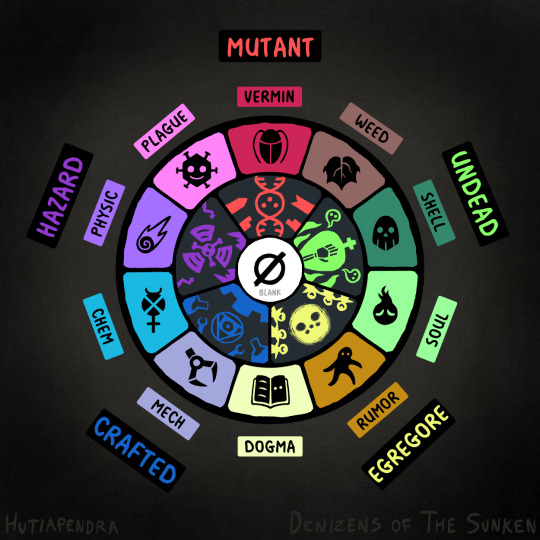
Some researchers have asked what all the graphic icons in our encyclopedia entries mean. The following document should explain them all.
PART 1: THE TYPE WHEEL
The creatures populating the Sunken Island can be classified under ten (eleven) different Types, and five (six) different Cores. This diagram illustrates the relationships between Types and Cores.
The inner wheel contains Cores, the intrinsic origins of a creature. The outer wheel contains Types, the modes of a creature’s existence. Cores have certain Types associated with them, though a creature may deviate from these common links entirely.
Cores:
MUTANT: Life as we know it, twisting and accelerating beyond explanation.
UNDEAD: That which is no longer alive, echoes clinging to this world.
EGREGORE: Collective concepts brought to life, human ideas.
CRAFTED: That which was deliberately built, taking on life of its own.
HAZARD: Life inimical to other life, parasites, forces of nature.
Types:
VERMIN: Beasts. That which scurries, scratches, consumes. The rage of a thousand cornered rats.
WEED: That for which growth and movement are one and the same. Plants. Fungi. Sessile animals.
SHELL: Corporeal undead. Cadavers. Dust. Fossils. Rot. Food.
SOUL: Incorporeal undead. Ghosts, grudges, hauntings. Aftershocks of history.
RUMOR: Beings born from whispers. Legends. Cryptids. Bogeymen. Fear. Uncertainty given flesh.
DOGMA: Beings born from rules. Philosophy. Religion. Information. Code. Conviction given flesh.
MECH: Automata. Mechanical monsters free to self-replicate, free from their origins in human factories.
CHEM: Homunculi. Chemical processes running rampant. Water, salts, fuel, coarse stone, refined crystals.
PHYSIC: Forces of nature. Extreme heat and cold. Storms. Blunt impact. Distant stars. Disasters passively harmful to life.
PLAGUE: Invaders. Parasites. Infections. Consumers from within. Pestilence actively harmful to life.
Blank:
A Type and a Core at the same time, Blank is defined by absence. Some would call this a 'normal' or 'neutral' attribute, but there is nothing normal about a creature devoid of an identity. What little unites these Denizens involves empty vacuums, blistering cold, and unfilled vessels. Blank creatures are rare, and they tend to behave oddly when exposed to other life forms.
-----
PART 2: THE KEMC DIAMOND
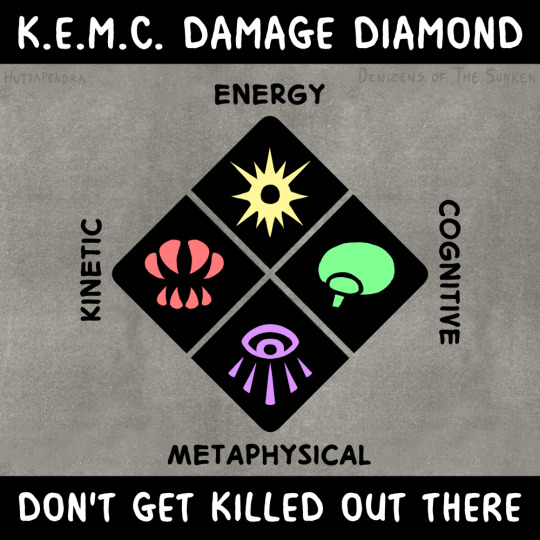
Damage varieties:
All Denizens have the ability to inflict harm on others. That includes you, reader. Please familiarize yourself with the risks inherent to field research before going outside to catalogue the wildlife.
KINETIC: Harm inflicted with physical means, such as claws, fists, fangs, or infection. By far the simplest form of danger to understand, but no less deadly.
ENERGY: Harm inflicted by emitting high levels of energy through comparatively small amounts of mass. This may take the form of fire, electricity, radiation, among others.
COGNITIVE: Harm inflicted by assaulting the mind and senses. Creating illusions, manipulating emotions, and altering memories all fall under this category.
METAPHYSICAL: Harm inflicted by locally rewriting the rules of reality. What was fiction a moment ago is now a fact of life, and yesterday's laws of physics are today's fairy tales.
-----
PART 3: HABITATS
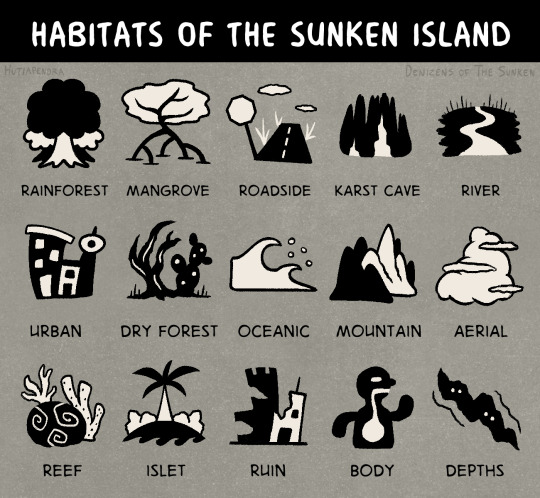
The icons above represent the various environments a Denizen may call home. The Sunken Island is very humid and situated well within the tropics, so many habitats such as deserts and glaciers have never been present here. Other icons may be added to the Denizen Encyclopedia if those presented are insufficient.
-----
That should cover everything, for now. If you have any other questions, please direct them my way!
-Dr. Calypso Ceiba, Postdoctoral ecologist for the Denizen Project
154 notes
·
View notes
Text
29 courses available at hogwarts university ·˚ ༘

disclaimer 001. this is accurate to my hogwarts university DR. take what resonates, leave behind what doesn't !!
disclaimer 002. this will be long. it's going to feel like it is going on for a very long time-- but you must stay strong !!
disclaimer 003. courses are listed in alphabetical order.
enjoy x
001. ALCHEMY
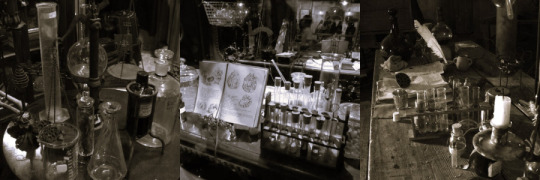
taught by - corbinus flamel
alchemy is a rare subject that combines magic, science, and philosophy to explore the transmutation of substances. this class delves deep into the mystical art of transforming materials at a molecular level, using both magical and non-magical processes.
students learn to work with magical ingredients and potions, but unlike potions, alchemy is focused on the fundamental transformation of matter. they study the properties of various metals, minerals, and liquids, understanding their magical properties and how they can be combined to create elixirs or even transmuted into new forms.
alchemy also teaches students the deeper philosophical and ethical questions surrounding the pursuit of power and knowledge. with its balance of magic, chemistry, and intellectual rigor, alchemy is a subject for those with a keen mind and a curiosity for the mysteries of the universe. though considered rare and challenging, alchemy provides profound insights into both magic and the natural world.
002. ANCIENT RUNES

taught by - bathsheda babbling
ancient runes is a fascinating and intellectually demanding subject that dives into the study of magical symbols and their meanings. unlike other spell-based classes, ancient runes is a theoretical discipline, requiring students to decode, translate, and interpret runic inscriptions left behind by ancient magical civilizations.
this subject introduces students to scripts such as the elder futhark and their applications in spell craft, enchantments, and warding magic. students learn how runes were historically used in powerful magical artifacts, secret writings, and protective charms, giving them insight into the ancient foundations of wizardry.
rather than focusing on wand work, ancient runes emphasizes language skills, historical context, and magical theory. students often translate old texts, uncover hidden meanings in inscriptions, and study how runes influence modern magic. advanced students may even learn to craft their own runic enchantments, imbuing objects with long-lasting magical properties.
though challenging, ancient runes is an essential subject for those interested in magical archaeology, curse-breaking, or deepening their understanding of spell craft. for students who enjoy puzzles, history, and the mysteries of ancient magic, this class offers a rewarding and scholarly look into the magical world’s past.
003. ANIMAGUS TRAINING

taught by - minerva mcgonagall
animagus training is an exclusive and highly prestigious elective that offers students the rare opportunity to master the art of becoming an animagus—the ability to transform into an animal at will. this class challenges students to tap into their deepest magical potential and learn to control the transformation process, a feat requiring both precision and deep self-awareness.
the class begins with a study of the history and theory behind animagus transformation, including the famous wizards who have successfully undergone the process and the dangers involved. students explore the complex relationship between wizards and their animagus form, discovering how their chosen animal reflects their personality, traits, and magical affinities.
the training involves rigorous practice in magical concentration, self-discipline, and the art of transfiguration. students learn how to shift between their human form and their animal counterpart, gradually gaining full control over the process. the class also covers advanced topics like maintaining human consciousness while in animal form, and how to use the animagus transformation for practical purposes, such as stealth or communication with certain magical creatures.
animagus training is a class for students who are dedicated, patient, and ready for the challenge of mastering one of the most difficult and rewarding forms of magic in the wizarding world.
004. ANIMAL COMMUNICATION
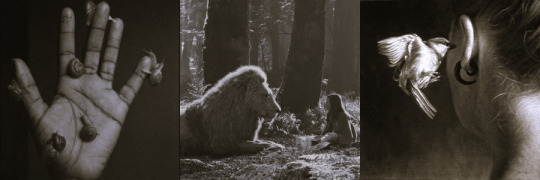
taught by - rubeus hagrid
animal communication is an elective that offers students the opportunity to learn the art of understanding and conversing with magical creatures. with an emphasis on magical zoology and the languages of various magical species, this class dives deep into the mystical bond between wizards and animals.
in this course, students begin by studying the basic principles of magical animal communication, including the various magical frequencies and empathic connections that allow one to "speak" with creatures. they learn how to interpret non-verbal cues, body language, and subtle magical signals that creatures use to communicate. students work with a range of magical animals, from domesticated magical pets like owls and hippogriffs to more complex creatures like thestrals and centaurs.
the class also teaches specific spells and techniques that can enhance one’s ability to communicate with these creatures, fostering mutual understanding and respect. students practice calming distressed animals, negotiating with magical creatures for assistance, and even deciphering ancient magical languages once spoken by now-extinct creatures.
animal communication is perfect for students who are passionate about creatures and want to form stronger bonds with the magical beings of the world. it teaches not just communication but a deeper empathy for the magical creatures that share the world with witches and wizards.
005. APPARITION

taught by - wilkie twycross
apparition is the highly anticipated and complex magical art of teleportation, allowing witches and wizards to instantly travel from one place to another without the need for broomsticks, floo powder, or portkeys. this class is essential for students who wish to master the art of disappearing and reappearing at will.
the process of apparition is difficult and requires a great deal of concentration, coordination, and focus. students must learn to properly concentrate on their destination, “twist” their bodies into the right mental space, and then successfully execute the charm without splinching—leaving behind parts of themselves when they travel. the risk of splinching is high in the early lessons, as the students struggle to control their movements and concentration.
apparition is a rite of passage at hogwarts, typically taught in the sixth year. the class requires intense practice and precision, and failure can lead to accidental and sometimes dangerous results. however, once mastered, apparition provides a convenient and efficient way to travel the wizarding world.
for students with the right mindset and determination, apparition offers a sense of freedom and independence, unlocking a new realm of magical mobility.
006. ARITHMANCY

taught by - septima vector
arithmancy is the magical study of numbers and their mystical properties. arithmancy blends mathematics with magic, exploring how numbers influence the world and impact a witch or wizard’s destiny. students learn to understand the vibrations of numbers, their symbolic meanings, and how they can be used to predict outcomes, create spells, or solve complex magical problems.
in arithmancy, students study everything from basic numerology, assigning meanings to each number, to advanced calculations, such as using numbers to determine compatibility in relationships or to evaluate magical potential. they also learn to decipher numerical patterns in magical phenomena, including the hidden significance behind the number of ingredients in potions or the exact alignment of stars during a magical event.
the subject appeals to those with a love for structure, logic, and analytical thinking. unlike other magical subjects that rely on instinct or wand work, arithmancy offers a more cerebral approach to magic, focusing on theory and precision. it is essential for students interested in fields like magical research, spell invention, and even magical finance.
for those with a talent for numbers, arithmancy is a deeply rewarding subject that offers a unique, mathematically driven approach to the wizarding world.
007. ASTRAL PROJECTION & DREAMWALKING
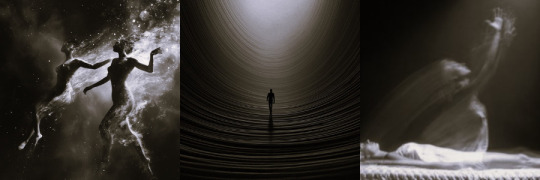
taught by - wilkie twycross
astral projection & dreamwalking is a fascinating and mysterious elective that teaches students the art of leaving their physical bodies behind and exploring the astral plane or walking through the dreams of others. students learn how to harness their magical abilities to enter states of deep meditation, allowing their consciousness to travel beyond the physical world.
in this class, students first study the theory of astral projection, understanding the nature of the soul, consciousness, and the boundaries between the material and spiritual realms. lessons involve mastering the techniques of projecting one’s astral form, allowing students to travel freely, explore distant locations, and even communicate with otherworldly beings. they also learn to protect their physical bodies while in the astral state to avoid any harm during their travels.
dreamwalking, another key component of the class, teaches students to enter and navigate the dreams of others. students learn to interpret symbols, influence dreamscapes, and even guide others through their dreams to offer comfort or insight.
this elective is ideal for those with a deep curiosity about the mind, the soul, and the unseen layers of the magical world, offering a chance to explore a unique aspect of magic that few truly understand.
008. ASTRONOMY

taught by - aurora sinistra
astronomy is a subject that blends the wonders of the night sky with the magical world. taught in the tallest tower of the castle, this class offers students the opportunity to study celestial bodies, planetary movements, and their significance in both magical and non-magical contexts. students learn to chart constellations, track the phases of the moon, and understand the influence of planetary alignments on magic.
unlike other classes, astronomy is held at midnight, with students gathering around telescopes to observe the vast expanse of the universe. they record their findings in detailed star charts and learn about the effects of celestial events on spell work, potion-making, and even magical creatures. the subject requires a mix of scientific precision and mystical insight, making it unique among hogwarts’ courses.
while it may not involve wand-waving or spell-casting, astronomy plays a crucial role in magical knowledge, especially for subjects like divination and arithmancy. it teaches students to respect the cosmos and its intricate patterns, showing how magic is woven into the very fabric of the universe. for those with a love of the stars, astronomy offers a magical perspective on the wonders of space.
009. CARE OF MAGICAL CREATURES
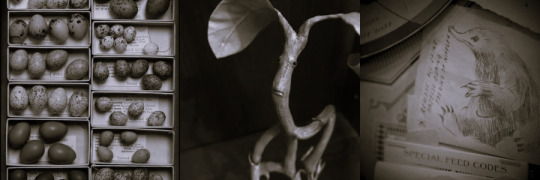
taught by - rubeus hagrid
care of magical creatures is a hands-on subject that teaches students how to care for and handle magical creatures of all shapes and sizes. the class takes students outdoors to interact with a wide range of magical beasts, from gentle creatures like hippogriffs and flobberworms to the more dangerous and unpredictable ones, like blast-ended skrewts and thestrals.
students learn not only how to care for these creatures but also how to understand their behaviors, needs, and magical properties. lessons often involve feeding, grooming, and sometimes even taming or riding these magical beings. safety is always a priority, but students also gain a deep appreciation for the magical creatures that play a vital role in the wizarding world.
care of magical creatures is a subject for students who are brave, patient, and ready for adventure. it teaches empathy and respect for animals, as well as practical knowledge for those interested in careers like magizoology or working with magical creatures in various fields.
the class offers a thrilling mix of learning and hands-on experience, making it a favorite for students who love animals and want to explore the magical world’s fascinating, living inhabitants.
010. CARTOGRAPHY

taught by - charity burbage
cartography is an intricate subject that teaches students how to create enchanted maps and navigate the hidden corners of the wizarding world. this class delves into the art of charting magical terrain, from the mysterious forbidden forest to secret chambers beneath the castle. students learn not only the traditional art of mapmaking but also how to imbue their maps with magical properties, such as self-updating features, the ability to reveal hidden paths, or to track magical creatures and events.
the class emphasizes both precision and creativity, as students must understand the physical and magical elements of mapping. lessons include using enchanted compasses, studying ancient maps, and learning how to interpret magical symbols that appear only under specific magical conditions. Students also explore how maps can be used for navigation, treasure hunts, or uncovering lost wizarding locations.
cartography is perfect for those who enjoy adventure, exploration, and a deep appreciation for the hidden secrets of the magical world. it's an elective that combines both practical skills and creative imagination, offering students the chance to leave their mark on the wizarding world through their own enchanted maps.
011. CHARMS
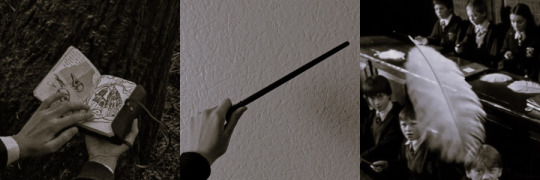
taught by - filius flitwick
charms is one of the most essential and exciting subjects at hogwarts, teaching students the art of casting spells that alter objects, influence behavior, and perform everyday magical tasks. charms is a favorite among many students due to its practical applications and engaging lessons.
in this class, students learn everything from simple levitation spells like wingardium leviosa to more advanced enchantments such as alohomora for unlocking doors, lumos for creating light, and protego for magical defense. through practice and precision, they refine their wand movements and incantations, mastering the delicate balance between intent, pronunciation, and wand technique.
charms is a subject that requires patience, focus, and creativity, as even the smallest variation in a spell can lead to unexpected results. as students progress, they explore more complex magic, including summoning charms, memory-related spells, and even silent casting.
beyond its practical uses, charms plays a fundamental role in many areas of magical life, from enchanting objects to performing daily tasks with ease. it is a subject that truly showcases the beauty and versatility of magic, making it an indispensable part of every young witch and wizard’s education.
012. CULINARY ARTS & ENCHANTED RECEPIES
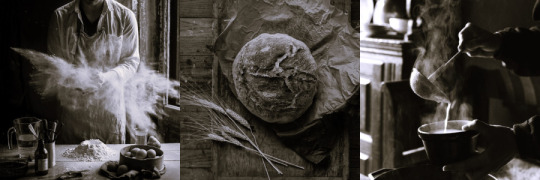
taught by - dobby the house elf
culinary arts and enchanted recipes is a delicious elective that combines the art of cooking with the magic of the wizarding world. in this class, students learn how to prepare meals using enchanted ingredients, magical utensils, and ancient recipes passed down through generations of witches and wizards.
throughout the course, students explore a variety of magical cooking techniques, from brewing potions with culinary effects to creating enchanted pastries that levitate or change flavors. they work with magical ingredients such as firevine herbs, floating fruit, and everfresh vegetables, learning how these ingredients can be used to create both everyday meals and extraordinary magical dishes. the class also covers the cultural significance of food in wizarding society, examining traditional feasts, celebratory recipes, and meals that can have magical properties—like those that enhance memory or give temporary abilities.
culinary arts and enchanted recipes is perfect for those with a passion for food, magic, and creativity. this elective allows students to explore how magic can transform the mundane into something truly extraordinary, all while sharpening their cooking skills and gaining hands-on experience in the kitchen.
013. DEFENSE AGAINST THE DARK ARTS

taught by - severus snape
defense against the dark arts is one of the most crucial and highly anticipated subjects at hogwarts, preparing students to protect themselves against dark creatures, hexes, jinxes, and malevolent magic.
students begin with fundamental protective spells like expelliarmus for disarming, lumos for warding off darkness, and petrificus totalus for immobilizing foes. as they progress, they learn more advanced magic, including counter-curses, shield charms like protego, and ways to defend against magical creatures such as dementors, werewolves, and boggarts. lessons often include practical, hands-on experiences where students duel, confront simulated dark creatures, and test their reflexes under pressure.
the subject isn't just about learning spells—it’s about developing resilience, quick thinking, and the courage to face the unknown. defense against the dark arts plays a vital role in shaping young witches and wizards into capable, self-reliant individuals, whether they pursue careers as aurors or simply wish to navigate the wizarding world safely. students never know what to expect—except that they’ll need to be ready for anything.
014. DIVINATION
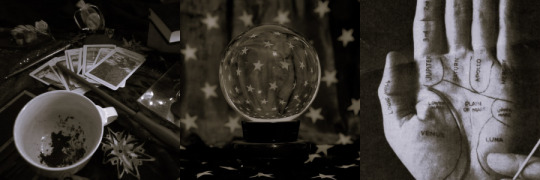
taught by - sybill trelawney
divination is the study of predicting the future through various mystical methods, offering a glimpse into the unknown. this subject draws on a range of techniques, including tea leaf reading, crystal ball gazing, astrology, and interpreting dreams. students learn to tap into their intuition and sense the subtle signs and patterns that can guide them toward future events.
divination is a highly symbolic subject, where much of the learning involves interpreting signs, omens, and other obscure messages from the universe. while some students have an innate connection to the prophetic world, others find the subject more challenging or even dubious, as the accuracy of predictions can often be vague or obscure.
despite its uncertain reputation, divination offers valuable insight into the world of fate, destiny, and intuition. while some may see it as unscientific or whimsical, others believe it is an essential way to understand the magic of the universe.
for students with an open mind and a deep interest in the mystical, divination is a captivating and sometimes mystical journey. it allows students to explore the mysteries of the future, even if they don’t always understand them fully.
015. ELEMENTAL MAGIC
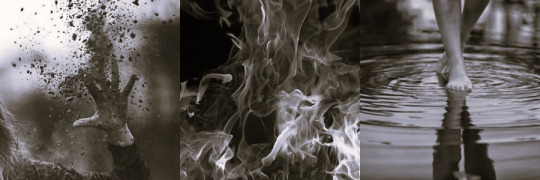
taught by - filius flitwick
elemental magic is an awe-inspiring elective that allows students to delve into the ancient and powerful art of controlling the four classical elements: earth, air, fire, and water. this class offers a deep exploration of how magic interacts with the natural world and how witches and wizards can tap into the raw power of the elements.
throughout the course, students learn how to manipulate and balance each element, starting with basic spells to summon winds, spark flames, and control water. as the term progresses, more advanced techniques are taught, such as creating barriers of earth, conjuring thunderstorms, or even using fire for precise magical tasks. students are encouraged to work in harmony with the elements, respecting their power and learning to control them safely.
in addition to practical spellcasting, the class also includes theoretical lessons about the spiritual and symbolic significance of each element in magical traditions. students explore ancient rituals, elemental creatures, and the delicate balance required to wield such power responsibly.
elemental magic is perfect for those who enjoy the challenge of mastering complex spells and have a deep respect for nature’s forces. it is a class that not only tests a student’s magical skill but their understanding of the world around them.
016. ENCHANTED ARTISTRY
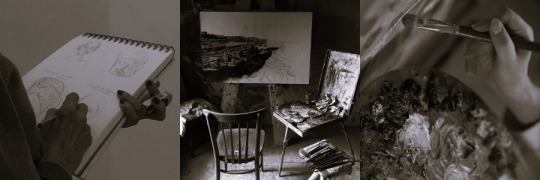
taught by - charity burbage
enchanted artistry is a magical elective that combines artistic expression with the wonders of magic, allowing students to create living, animated illustrations. this class introduces students to the enchanting world of visual magic, where artwork comes to life through spells, charms, and creative imagination.
throughout the course, students begin by mastering traditional art techniques, such as sketching, painting, and shading, before learning how to infuse their creations with magic. they are taught the art of animating their drawings, turning static images into dynamic, moving illustrations that can interact with their environment. from creating enchanted portraits that blink and smile to designing magical landscapes that shift and change with the viewer’s perspective, students learn how to harness both their artistic and magical talents.
the class also covers the history of enchanted art, exploring famous magical artists and the evolution of enchanted illustrations in the wizarding world. students practice using a variety of magical tools and techniques, such as the charm that makes a drawing respond to sound or touch, and they explore how these enchanted illustrations can be used in magical books, advertising, or even as a form of magical communication.
enchanted artistry is perfect for students who are passionate about art and magic, offering a unique opportunity to merge creativity with powerful spell work, creating stunning and interactive works of magical art.
017. FLYING
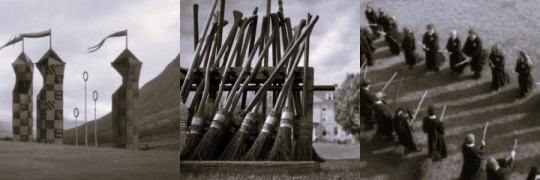
taught by - madam hooch
flying class is a thrilling course on the art of broomstick riding. held on the school’s expansive grounds, the lessons begin with the basics—learning how to summon a broomstick with a firm “up!” and mastering balance, control, and lift-off. students gradually progress to hovering, maneuvering through obstacles, and executing controlled landings. while some take to the air effortlessly, others struggle with the unpredictability of their broomsticks, leading to both amusing and nerve-wracking moments.
flying is not just a skill but an essential part of wizarding culture, used in everything from daily travel to quidditch—the fast-paced and beloved sport of the wizarding world. while only first-years are formally required to take the class, many students go on to join quidditch teams or simply enjoy recreational flying.
for those with a love of speed, height, and adventure, flying lessons offer an unforgettable experience that opens the sky to endless magical possibilities.
018. HERBOLOGY
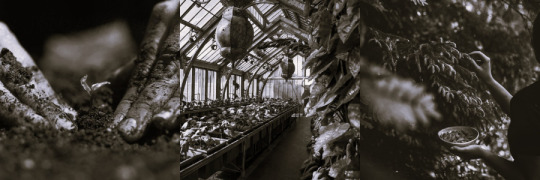
taught by - pomona sprout
herbology is the study of magical plants and fungi, a vital subject for any aspiring witch or wizard. lessons take place in the hogwarts greenhouses, where students learn to identify, cultivate, and utilize a variety of magical flora.
in the early years, students are introduced to fundamental plants like the shrivelfig and puffapod, gaining hands-on experience in potting, pruning, and harvesting magical herbs. as they progress, they encounter more complex and dangerous species, such as the venomous tentacula, the shrieking mandrake, and the highly valuable gillyweed. each lesson requires patience, care, and a strong stomach, as some plants have defensive mechanisms, potent odors, or even the ability to fight back.
herbology is not just about growing plants—it is deeply connected to potion-making, healing, and even magical defense. many of the ingredients used in powerful spells and elixirs, from wolfsbane potion to veritaserum, originate in the hogwarts greenhouses.
for those with a green thumb or an interest in magical botany, herbology is a rewarding and essential subject that reveals the wonders—and dangers—of the wizarding world's plant life, proving that nature itself can be a powerful form of magic.
019. HISTORY OF MAGIC

taught by - cuthbert binns
history of magic is a comprehensive study of the wizarding world’s past, covering legendary events, influential figures, and the evolution of magical society. the class is known for its vast wealth of knowledge—though staying awake through the lectures can sometimes be a challenge.
students explore key moments in magical history, from the goblin rebellions and giant wars to the international statute of secrecy and the founding of hogwarts itself. they learn about famous witches and wizards, such as merlin, the four hogwarts founders, and various ministers of magic, gaining insight into how magic has shaped civilizations over the centuries.
despite its dry reputation, history of magic is crucial for understanding the roots of magical law, ethics, and conflicts that continue to influence the wizarding world. those who pay close attention develop a deep appreciation for the triumphs and mistakes of the past, learning valuable lessons about power, prejudice, and magical responsibility.
while it lacks the hands-on excitement of other subjects, history of magic remains an essential course, proving that knowledge of the past is just as powerful as magic itself.
020. MAGICAL MUSIC COMPOSITION
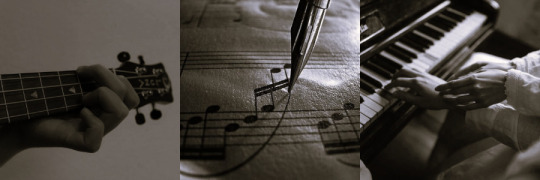
taught by - sirius black
magical music composition is an elective that blends the art of music with the power of magic. in this class, students learn how to compose magical music that not only evokes emotions but can also produce tangible magical effects. this class explores the enchanted properties of sound and how it can be harnessed for various magical purposes.
students begin by studying the fundamentals of music theory, including scales, harmony, and rhythm, before learning how magical notes and melodies can influence the world around them. they explore ancient musical spells, discovering how music can summon creatures, enhance spells, or even alter the weather. lessons also cover the enchanted instruments that wizards and witches use to compose and perform magical pieces, such as the harp of the sirens or the enchanted flute of the ancient bardic traditions.
throughout the course, students compose their own magical pieces, experimenting with melodies that can heal, calm, or empower others. the class also emphasizes the emotional and psychological effects of music, teaching students how to harness these qualities to create music that resonates deeply with the listener.
magical music composition is perfect for those who wish to combine their love of music with their magical abilities, offering a unique and magical approach to composition and performance.
021. MUGGLE STUDIES

taught by - arthur weasley
muggle studies offers an exploration of the non-magical world, teaching young witches and wizards about muggles—people who lack magical abilities—and their ways of life. the subject aims to bridge the gap between the magical and non-magical communities, fostering understanding, tolerance, and respect.
muggle studies covers a wide array of topics, from muggle inventions like cars and telephones to their art, culture, and social structures. students learn about muggle history, government, technology, and entertainment, gaining insight into how muggles have built their societies without the aid of magic.
the subject is essential for witches and wizards who wish to interact with the non-magical world, whether it’s for social reasons, work, or simply out of curiosity. muggle studies helps students understand the similarities and differences between the two worlds, breaking down stereotypes and misconceptions that often divide them.
while it may not involve magic directly, muggle studies is invaluable for any witch or wizard hoping to navigate the complex relationship between the magical and non-magical communities. for those intrigued by the everyday lives of muggles, this class offers a unique perspective on a world that’s both familiar and entirely different.
022. MYSTIC HEALING

taught by - madam poppy pomfrey
mystic healing is an essential elective that introduces students to the practice of magical medicine, combining both theoretical knowledge and practical skills to heal injuries and illnesses caused by magical and non-magical means. this class is designed to provide students with the tools they need to safely and effectively use magic to mend wounds, cure ailments, and restore health.
throughout the course, students learn to identify various magical injuries—such as curse damage, potion-related poisoning, and creature bites—and apply the appropriate healing charms and potions. the class covers a range of techniques, from simple spells to heal cuts and bruises to more complex incantations for broken bones, magical diseases, and even curses. students are also taught to recognize the signs of magical maladies, including rare magical illnesses that require specialized treatment.
in addition to practical healing methods, the class emphasizes the importance of empathy, ethics, and responsibility when working with patients. students learn to approach healing with care and sensitivity, understanding the emotional and psychological impacts of illness and injury.
mystic healing is ideal for students interested in pursuing a career in magical medicine, offering a comprehensive education in healing magic while preparing them to make a positive impact on the wizarding community.
023. MYSTIC MYTHOLOGY
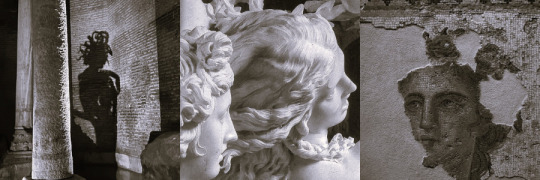
taught by - remus lupin
magical mythology is an elective that immerses students in the myths, legends, and folklore of the wizarding world. the class delves into the rich and diverse mythological creatures, deities, and magical events that have shaped the magical community for centuries.
throughout the course, students explore the origins and significance of famous magical myths, such as the legend of the phoenix, the creation stories of magical creatures like hippogriffs and thestrals, and the mystical realms that exist beyond the known world. the class also examines how these myths have influenced wizarding culture, magic, and society, from magical rituals to powerful artifacts.
in addition to studying the traditional myths of the wizarding world, students engage in discussions about the commonalities between wizarding myths and those of muggle cultures, discovering the shared symbolism and universal themes that connect magical and non-magical stories. they also learn how myths have been preserved through enchanted texts, magical storytelling, and even in the stars.
magical mythology is perfect for students with a curiosity for ancient stories and a desire to understand how magic, history, and culture intertwine. This elective not only enhances magical knowledge but also inspires a deeper appreciation for the myths that define the wizarding world.
024. POTIONS

taught by - severus snape
potions is a precise and demanding subject that teaches students the art of brewing magical mixtures with powerful effects. this class requires patience, skill, and an exacting attention to detail, as even the smallest mistake can turn a simple elixir into a dangerous concoction.
students learn to craft potions ranging from the everyday cure for boils to the complex and coveted felix felicis, also known as liquid luck. they master techniques such as stirring methods, ingredient preparation, and the correct timing for adding volatile substances. mistakes can be costly, resulting in cauldron explosions or unintended magical side effects.
though it lacks the wand work of other subjects, potions is essential for fields like healing, magical research, and even defense against dark forces. many of the most powerful remedies and poisons in the wizarding world originate in potion-making.
for those with a sharp mind and steady hand, potions is both an art and a science—one that can unlock limitless magical potential. however, it demands discipline, as true mastery is reserved for only the most dedicated students.
025. TRANSFIGURATION
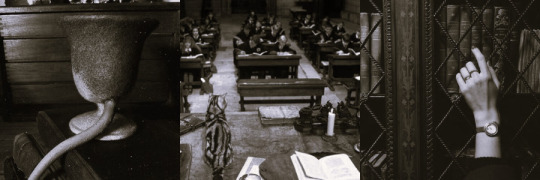
taught by - minerva mcgonagall
transfiguration is one of the most complex and challenging subjects at hogwarts, teaching students the art of altering the form and nature of objects, animals, and even themselves. this subject requires immense focus, precision, and control, as even the slightest miscalculation can lead to unexpected—and sometimes disastrous—results.
students begin with basic transformations, such as turning matches into needles and teacups into rats, before progressing to more advanced spells like vanishing, conjuration, and human transfiguration. each lesson emphasizes the four key principles: wand movement, concentration, incantation, and willpower. mastering transfiguration is no easy feat, as spells require not just knowledge but a deep understanding of magical theory and energy manipulation.
unlike charms, which enhances objects without fundamentally changing them, transfiguration alters the very essence of an object. it plays a crucial role in many branches of magic, including animagus transformations, dueling, and even magical crafting.
for those who excel, transfiguration offers boundless possibilities, from reshaping the world around them to achieving feats of incredible magical skill. however, it is a subject that demands respect, as even the most talented witches and wizards must practice tirelessly to perfect its delicate and powerful magic.
026. WANDCRAFT & CUSTOM WAND-MAKING

taught by - sirius black
wandcraft and custom wand-making is an exciting and hands-on elective that invites students into the intricate world of wand design and creation. this class delves into the art and science behind crafting wands, an essential tool in the wizarding world. students learn not only how to select and combine the right materials but also the deep magic that infuses a wand with power and personality.
throughout the course, students begin by studying the history of wand-making, including the legendary wandmakers like ollivander and the ancient techniques used to craft wands. they learn about the essential components of a wand—wood, core, and length—and how each choice influences a wand's magical properties. students also explore the delicate balance of these materials, understanding how different combinations create wands with unique affinities to specific types of magic.
the class is deeply practical, with students getting the chance to craft their own wands using enchanted tools, selecting woods from magical forests, and experimenting with various magical cores like phoenix feathers, dragon heartstrings, and unicorn hair. as students progress, they learn how to customize wands for specific magical practices, from dueling to potion-making, and how to care for and maintain a wand over time.
wandcraft and custom wand-making is perfect for students who have a passion for craftsmanship and want to understand the profound relationship between a wizard and their wand.
027. WANDLESS MAGIC

taught by - albus dumbledore
wandless magic is a specialized and highly sought-after elective that teaches students the art of casting spells without the use of a wand. this class challenges students to master the ancient and subtle forms of magic that predate the use of wands, requiring a deep understanding of concentration, intent, and gesture.
in this course, students begin by learning the foundational principles behind wandless magic, including the importance of mental focus and the manipulation of magical energy through one’s own will. unlike traditional spellcasting, wandless magic relies on personal magical strength, physical movements, and a strong connection to one’s own magical essence. students practice casting simple charms, like light-producing spells, and gradually progress to more complex tasks, such as levitation and disarming opponents, all without the aid of a wand.
the class also explores the historical significance of wandless magic, examining ancient wizarding traditions and magical cultures where wandless spellcasting was common. students learn about the limitations and advantages of wandless magic, including its potential for silent, stealthy spellcasting, and its connection to more intuitive forms of magic.
wandless magic is ideal for students seeking to expand their magical abilities beyond conventional methods and who enjoy the challenge of mastering a more instinctive, personal approach to spellcasting.
028. WIZARD COMBAT
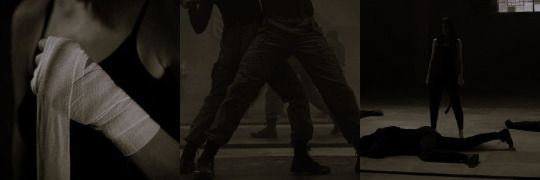
taught by - nymphadora tonks
wizard combat is a unique and practical elective that combines physical combat with magical defense techniques. this class equips students with the skills needed to defend themselves in a variety of situations, blending magical and non-magical combat styles.
in this course, students begin by learning the fundamentals of traditional martial arts techniques—such as stances, footwork, and strikes—before incorporating magic into their movements. they learn how to use spells for self-defense, such as stunning spells, disarming charms, and protective barriers, all while maintaining physical control and agility. the class emphasizes fluidity and coordination, teaching students to react quickly and efficiently in both magical and physical confrontations.
the course also covers the history of magical combat, exploring ancient wizarding traditions of martial arts, as well as magical creatures that use combat skills. students practice dueling techniques, learning how to balance physical attacks with spellcasting in a seamless flow.
wizard combat is perfect for students who enjoy active, hands-on learning and want to build strength, discipline, and confidence. it teaches both defensive and offensive magic, empowering students to protect themselves and others, all while honing their magical and physical coordination.
029. WIZARD PRESS 101

taught by - remus lupin
wizard press 101 is an engaging elective that immerses students in the world of magical news, reporting, and the ethics of journalism within the wizarding community. this class offers students the opportunity to learn both the craft and responsibility of magical journalism, with a focus on accuracy, objectivity, and the impact of magic on society.
in this course, students explore the structure of magical news outlets, examining the challenges and rewards of reporting on magical events, ranging from quidditch matches to major political scandals, and even the occasional encounter with dark magic. they learn how magical photographs, enchanted quills, and self-writing parchment contribute to the unique nature of wizarding journalism. students also practice writing and editing their own articles, learning how to use magical tools to gather information, from invisibility cloaks for undercover reporting to pens that record spoken words.
the class also covers the moral and ethical considerations of magical reporting, such as the need to protect privacy, the consequences of sensationalism, and the role of journalists in shaping public opinion.
wizard press 101 is ideal for students who enjoy storytelling, have a passion for current events, and want to contribute to the magical community through responsible, impactful reporting.
#shifting#reality shifting#shiftblr#shifting community#scripting#hogwarts uni#hp universe#hogwarts university#shifting motivation#shifting blog#koifishog#shifting script#hogwarts#shifting to hogwarts#𓅓⋆˚࿔ koifish HU
143 notes
·
View notes